#Roger Davis imagine
Explore tagged Tumblr posts
Text
Subway- Roger Davis

Pairing: Roger Davis x Reader
Characters: Roger Davis
Warnings: N/A
Request: @musically-ambiguous - hi, can i request an imagine about roger from rent? something where he gets protective over short!reader? can reader be genderfluid? if not, it's fine. ty! and i meant for my previous ask, that roger (rent) and reader are dating. ty! idk if i mentioned that lol
Word Count: 460
Author: Charlotte
Although your height had started as a point of humour for Roger, he had become overly protective of you thanks to how people often treated you. You may be vertically challenged but you weren’t incompetent as others sometimes believed; you just sometimes needed help reaching to top shelf or you’d have to climb your way up there.
Whenever you were out in a busy area, Roger always had hold of your hand, finding it easy to lose you amongst the hustle and bustle of New York. This became especially evident when you tried to use the subway during rush hour. You would walk directly in front of him, and he’d keep hold of your hand to try and make sure you could manoeuvre the crowds together and make your way onto the same train without one of you getting stuck on the platform.
Tonight, you managed to get onto the subway, but so did half of the city by the looks of it. You had been shuffled into the middle of the carriage without access to a seat of a pole to hold onto. You looked up to the hanging handles and knew that it was out of your grasp and would only be embarrassing to try.
Everyone was moving around, fighting for their own personal space as the train doors closed, whilst you were trying to turn yourself around so that you could latch onto your boyfriend like a bush baby. As the train began to move along, people wobbled around, trying their best to keep their balance. The man beside you stumbled as the subway jolted. He attempted to catch himself but as he did, his arm flew out, the elbow colliding with your face due to being elbow height.
You let out a grunt, loosening your grip on Roger and almost falling over. The doors of the train opened for the next stop, leading to enough people to shuffle around that you wouldn’t have been able to point out who injured you.
Roger was steadying you, but your eyes were becoming blurred from the build up of tears. It hurt but the tears were from the blow to your face rather than the pain.
“What happened?” He asked, looking around for your supposed attacker but you were none the wiser who it was.
You couldn’t manage to get the words out, instead only letting out a squeak.
“You’re bleeding,” he frowned. “We’re getting off at the next stop.”
He held you close, only loosening his grip on you when you winced at your face touching his chest. He leant down and pressed a kiss to the top of your head, still keeping an eye out to see if he could point out who had hurt his girlfriend.
#Subway#Anon#Request#Roger Davis#Roger Davis Imagine#Roger Davis One Shot#Rent#Rent Imagine#Rent One Shot#Charlotte
11 notes
·
View notes
Text
Pick your favorite character❤️🔥
#javier peña#Survey#fictional characters#imagines#fictional boyfriend#jensen ackles#dean winchester#chris evans#supernatural#fictional crushes#jake gyllenhaal#pedro pascal#dave york#castiel#sam winchester#david loki#colt seavers#Davis Mitchell#demolition#the fall guy#steve rogers#the avengers#sierra six#marcus moreno#elwood dalton
29 notes
·
View notes
Text
I genuinely will never understand why I torture myself by looking for comics and fanfics of how luffy and Sabo are impacted by Aces death.
Like I remember being in my room when the episode came out crying my goddamn eyes out to the point of my brother asking me if I’m alright, and every year like clockwork I decide to relive that pain.
Atleast it usually starts with me looking for fanfics of the brothers living happily and being able to meet eachother again but damn I a slut for pain I guess.
#one piece#aces death#Ace#Sabo#luffy#I just want them to be happy#Ace never got to know that Sabo was still alive#bet he died and went to the after life expecting to see Davi#only to be greeted by nobody#maybe gol d rogers#imagine that fight
13 notes
·
View notes
Text
Started the Roger Davis episodes. He’s not bad but man I miss Pete. :(
#alias smith and jones#asj#roger davis#the chemistry is missing too#god poor Ben#actually poor Roger#I can’t imagine taking over for your friend literally hours later
3 notes
·
View notes
Text

🦅⚡️The Ravenclaw Quidditch Team⚡️🦅
Happy September 1st everyone! We’re going back to Hogwarts!! I’m so excited for the fall, I’ve got some great projects coming up :)
I want to draw all the Quidditch teams, because I want to draw all the uniforms in the house colours, so sue me :)
I found the names of all the Ravenclaw players through a little digging and invented their descriptions myself. With Ravenclaw, we only know Cho and Roger Davies, and Roger was never even described, other than he’s handsome. That makes it more fun for me, because I can use my imagination ✨🤗
I hope you like it!
#illustration#harrypotteruniverse#illustrator#hogwarts#characterdesign#harrypotterart#characterart#harrypotterdesign#characterdesignsheets#ravenclaw#Ravenclaw Quidditch#ravenclawquidditchteam#Cho hang#Roger Davies#gobletoffire#wizardingworldillustrations#yuleball hogwarts#hogwarts school of witchcraft and wizardry#quidditchuniforms#hogwartsuniform#hogwarts quidditch#costumedesign harry potter#goldentrioera#goldentrio#september 1st#hogwarts express#platform 9 3/4
195 notes
·
View notes
Text
Gatorbites-imagines kinktober 2023

I can’t remember my stories from last year, so if any are similar its honestly a mistake, I cant be bothered to go back and check them all.
Like last year I can’t promise ill post consistently every day, but I’ll do my best to do so, or just getting all my prompts filled out.
I used a randomizer to put these together. Feel free to write any of these or use any of my prompts, if you do, please tag me, I’d love to read them.
Alec Lightwood + Praise Kink
Astarion Ancunin + Bloodplay
Michael Myers + Drugged and/or captured
Hal Jordan + Size difference
Anakin Skywalker/Darth Vader + Uniform Kink
Clark Kent + Alien Biology
Mickey Milkovich + Wrestling and sparring
Simon “Ghost” Riley + Gun and/or Knifeplay
Roy Harper + Musk and/or Sweat
Miguel O'Hara + Aphrodisiacs
James Bucky Barnes + Choking and breathplay
Roronoa Zoro + Cumplay (snowballing, felching, etc)
Donquixote "Corazon" Rosinante + Bondage/Shibari
Conner Kent + Breeding and/or excessive cum
Stu Macher + Edging and/or milking
Jason Todd + Leather or Latex
Homelander/John Gillman + Cock warming
Steve Rogers + Title Kink (daddy, sir, etc)
Din Djarin + Markings (hickeys, bruises, tattoos, etc)
Guy Gardner + Semi-public or Exhibitionism
Ian Gallagher + Waxplay and/or temperature play
Steven Grant, Marc Spector and Jake Lockley + Omegaverse
Dick Grayson + Prostate massage/torture
Tyler Durden and Jack "The Narrator" + Masks and helmets
Aaron Davis + Reunion sex
Sanji Vinsmoke + Dry Humping and/or frottage
Bruce Wayne + cock cages
Mike Schmidt + Desperation
John “Soap” MacTavish + Muscle/Body worship
Tim Drake + Rimming
Boba Fett + Oral Fixation
#kinktober#shadowhunters#baldurs gate 3#slashers#dc#marvel#cod#call of duty#shameless#shadowhunters imagine#shadowhunters headcanon#baldurs gate 3 imagine#baldurs gate 3 headcanon#slasher imagine#slasher headcanon#dc imagine#dc headcanon#marvel imagine#marvel headcanon#cod imagine#cod headcanon#call of duty imagine#call of duty headcanon#shameless imagine#shameless headcanon#star wars#star wars imagine#star wars headcanon#the boys#the boys imagine
862 notes
·
View notes
Text
Ghost ship!Oro Jackson AU
You know Davy jones cursed ship/crew from the franchise “Pirates of the Caribbean” ?
Well, this AU is inspired by it!
Yandere Roger Pirates?
—-
Imagine Roger and his crew they obtained the title of “King of the pirates” and instead of retiring Roger picks up his boys and continues sailing the sea as a pirate crew.
But one night something bad happens, they are attacked by a rival pirates, a merciless one that to Roger’s horror seemed to gain on them. Many thoughts ran through his and his crews head but one thought stood on the top to all of them…
“Save our boys”
Roger signaled to whatever left of the crew to ensure the safety of Shanks and Buggy that even if this night was there last none of them accepted the young teens to perish with them. However, many things happened that separated them from the cabin boys, the last thing Roger remembers was Calling his boys names before everything went dark.
When he woke up again everything was different.
His body felt, cold and stiff. His ship was destroyed but somehow still floated above the isolated sea. When he looked around he saw his crew, they were waking up and seemed to be as confused as him but what drew his attention was how they looked odd. Those who lost limps during the battle got a replacement one which was in the form of a crab claw or other sea creature’s limp. Their skin were gray, and some had sharp teeth as if they were fish men. The more he searched the more differences he found and the more confused he got. He ran to his cabin and saw himself on the broken mirror. His fears were confirmed he too was changed.
He then remembered Shanks and Buggy and climbed back up again and ordered everyone to search for the boys. Everyone seemed to be alerted as they ignore the odd feelings of their new bodies and started marching among the ship, calling for Shanks and Buggy. Rayleigh even threw himself in the water in a desperate attempt to find them, but the only thing he found out is that they don’t need to breath anymore.
When they gathered, Roger explained how he too doesn’t know what happened or why this happened to them. Did someone use a devil fruit power on them? Did the sea gods curse them? Was this just a miracle in disguise? They don’t know.
All they know is these few things.
First, they are back from the dead and in a twisted way stronger than before.
Second, despite their ship being an absolute wreck it somehow still floats,which is a good thing.
Third, they all agreed to stay away from any land sense they felt themselves grow weak when they attempted to reach shore, meaning something bad could happen if they truly reach the shore.
Finally, and most importantly!!
Shanks and Buggy are not with them, and they NEED to find them, they NEEDED to know where they are, whether they survived or worst died and their bodies are somewhere in an unmarked watery grave. They didn’t care, all they wanted is for Shanks and Buggy to board this ship with them because they are part of them. They weren’t just Cabin boys, they were their sons, their precious boys whom they raised.
And they NEEDED THEM BACK!
meanwhile, Shanks and Buggy did survive but not without a heavy loss.
When Buggy opened his eyes he found himself on the shore of an unknown island. He threw up water and was disoriented, but his thoughts quickly reminded him of Shanks. He stood up to look for the red hair, which wasn’t difficult to find him since he was a few feet away but the condition he found him in was terrifying.
Shanks’s eye was scared and his left arm seemed to have been torn out, his skin was deathly pale and Buggy thought the worst, but his stubbornness was what saved the red hair.
Buggy denied Shanks’s death and used whatever power he had to carry Shanks for hours to the nearest village where he collapsed after making sure that Shanks did have a heartbeat and could be saved. The bluenette maybe didn’t lose a limp but that didn’t mean he didn’t sustain some internal injuries.
It took weeks but the boys were finally awake.
After crying over the loss of their crew they discussed what they should do next. Buggy didn’t want to be a pirate anymore, especially after the fight they somehow survived and how everyone is now deciding to become a pirate after learning of Roger’s death.
Shanks tried to argue, saying how this was their legacy and destiny to be great pirates. But Buggy remembers how Shanks was so close to death that it is a miracle he was still talking and continued to refuse the idea.
He begged Shanks not to sail away to leave him, that he didn’t want to lose anymore of his family and wants Shanks to stay with him. Shanks loved Buggy and would do anything for him, but he also loves to be a pirate and can’t let go of what his soul is calling for, and right at that moment his soul was torn between staying with Buggy or sailing away.
In the end Shanks compromised that he will stay with Buggy but he won’t stop being a pirate but this time a land pirate. ((A bandit??))
—-
To the present where Luffy sails the sea to be the next king of the pirates, inspired by red hair Shanks from the traveling circus, who told him stories of his time on the sea and how misses it sometimes, but that being with his husband the ringleader was enough.
But Luffy saw beyond that he didn’t want to settle being on land, he wanted to sails the seas!!
So he goes through his adventures, forms his crew. And someday he comes across a haunted Ship, they have a fight but considering Luffy and Roger’s nature the fight would probably end up in a small party where the strawhat pirates are scared sh*tless of the undead ghost pirate. Of course learning the they are the infamous pirate king crew makes Luffy go on a hyperdrive.
Some questions are asked and stories are told, but it all comes to a stop when Luffy shares the story of how he became a pirate and the mention of the pirate named shanks and his blue haired husband. The environment becomes hostile as the Roger pirates starts asking where they are, which sea are they in right now, what is the fastest route to find them. Husband? Did they get married? They got that old already? Maybe we should get a gift for them on the way.
Now, at first the strawhat pirates thought that maybe they wanted to say hello and have a proper goodbye with their sons, but the Roger pirates only laugh at that idea, why would they say goodbye? They want to get their kids back. They have a life of their own now? Their lives started on the Oro Jackson and should continue/end there. They would fight back? Why would they? We are their family they always depended on them they can’t live without them.
And if they did ended fight back… well, let’s say the Roger pirates would go to an unwanted length to ensure their boys return after they one of the things they discovered is that whoever dies in the Oro Jackson always comes back to life and be part of them….forever.
#shuggy#buggy the clown#red haired shanks#one piece silver rayleigh#silvers rayleigh#gol d. roger#roger pirates
65 notes
·
View notes
Text
Broaden Your Horizons 2024
A Non-Fiction Rec List by Salvadorbonaparte
Books
Adventures in Yiddishland: Postvernacular Language and Culture - Jeffrey Shandler
A Good Man in Evil Times: The Heroic Story of Aristides de Sousa Mendes -- The Man Who Saved the Lives of Countless Refugess in World War II - Jose-Alain Fralon, Peter Graham (trans.)
Brief Answers to the Big Questions - Stephen Hawking
Erebus: The Story of a Ship - Michael Palin
Every Word Is A Bird We Teach To Sing: Encounters with the Mysteries and Meanings of Language - Daniel Tammet
Federico Garcia Lorca: A Life - Ian Gibson
Getting to Yes: Negotiating an agreement without giving in - Roger Fisher, William Ury
I Am Malala: The Girl Who Stood Up for Education and Was Shot by the Taliban - Malala Yousafzai
Ice Ghosts: The Epic Hunt for the Lost Franklin Expedition - Paul Watson
Identity and Violence: The Illusion of Destiny - Amartya Sen
If I Understood You, Would I Have This Look on My Face?: My Adventures in the Art and Science of Relating and Communicating - Alan Alda
Imagined Communities: Reflections on the Origin and Spread of Nationalism
Iwígara: American Indian Ethnobotanical Traditions and Science
Lingo: A Language Spotter's Guide to Europe - Gaston Dorren, Alison Edwards (trans.)
Monsters in the Closet: Homosexuality and the Horror Film - Harry M. Benshoff
One River: Explorations and Discoveries in the Amazon Rainforest - Wade Davis
Watching the English: The Hidden Rules of English Behaviour - Kate Fox
What's Your Pronoun? Beyond He and She - Dennis Baron
Documentaries
Bowling for Columbine
Break It All: The History of Rock in Latin America
ReMastered: Tricky Dick and the Man in Black
She's Beautiful When She's Angry
Street Gang: How We Got to Sesame Street
Podcasts
Clear+Vivid with Alan Alda
Freaks and Psychos: The Disability in Horror Podcast
Lingthusiasm
Ologies with Alie Ward
Root of Evil: The True Story of the Hodel Family and the Black Dahlia
The Sewers of Paris
#non fiction#nonfiction#book recs#podcasts#documentaries#documentary#podcast recs#book recommendations#podcast recommendations#rec list
152 notes
·
View notes
Note
The Graham Norton Show and Cait just started following each other. Hoping she'll be on the show soon.
Thanks for the message, Anon. 😃 She’s not listed among the guests for the balance of 2024. Let’s hope she shows up on Graham’s stage in the new year. 🥳
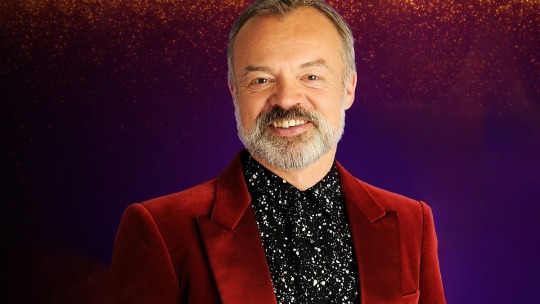
The Graham Norton Show / BBC
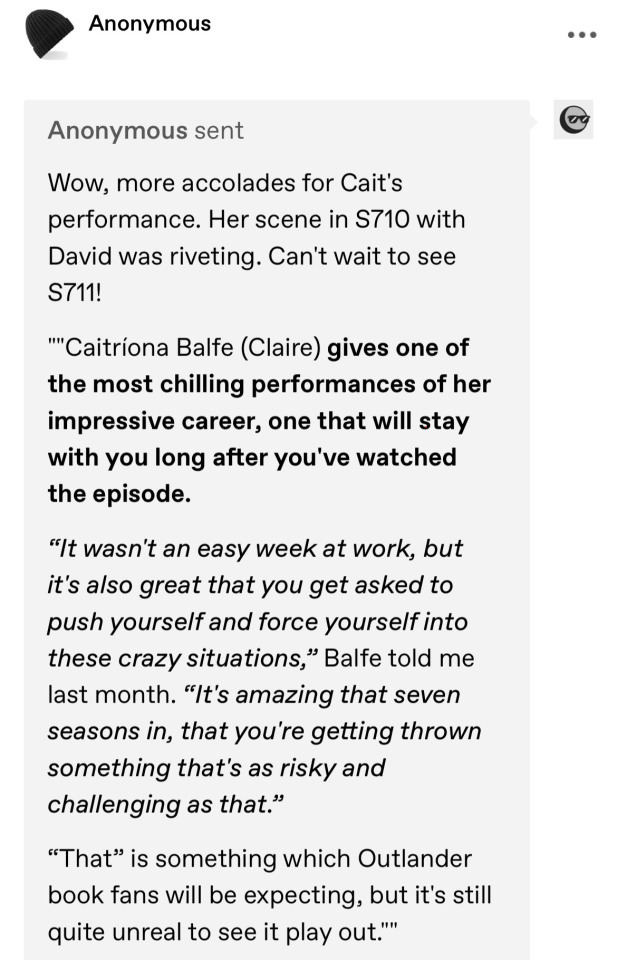
Thanks for the message, Anon. 😃 I watch Outlander on someone else’s schedule, so have only just seen Brotherly Love. I always enjoy watching Claire/Lord John scenes, and look forward to more of them… my dear. 😉
🚨 Spoilers ahead for S07E11 A Hundredweight of Stones
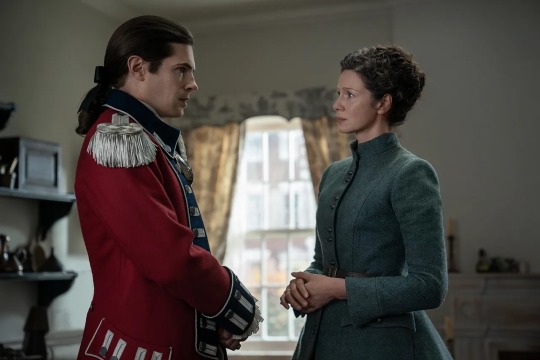
Things are about to change for Lord John and Claire. Robert Wilson/Starz
What to Watch the Week of December 1: Outlander's Most Jaw-Dropping Episode Yet
Get ready for Outlander to devastate, shock, and surprise you in one of the most explosive hours of TV yet. Following this past week's episode (in which Claire got some devastating news...no spoilers it you're not caught up), we enter episode 711 with Claire's life in shambles, Roger and Buck no closer to finding Jem, and Brianna ready to do battle with anyone who comes between her and her family.
When I previewed the new (half) season of Outlander in this guide a few weeks ago, I teased its gut-wrenching and raw return and this episode is why. Caitríona Balfe (Claire) gives one of the most chilling performances of her impressive career, one that will stay with you long after you've watched the episode.
It wasn't an easy week at work, but it's also great that you get asked to push yourself and force yourself into these crazy situations," Balfe told me last month. "It's amazing that seven seasons in that you're getting thrown something that's as risky and challenging as that.
"That" is something which Outlander book fans will be expecting, but it's still quite unreal to see it play out. Come back to Glamour on Friday, December 6 to read more of what Balfe has to say as well as Sam Heughan's thoughts and more from executive producers Maril Davis and Matthew B. Roberts.
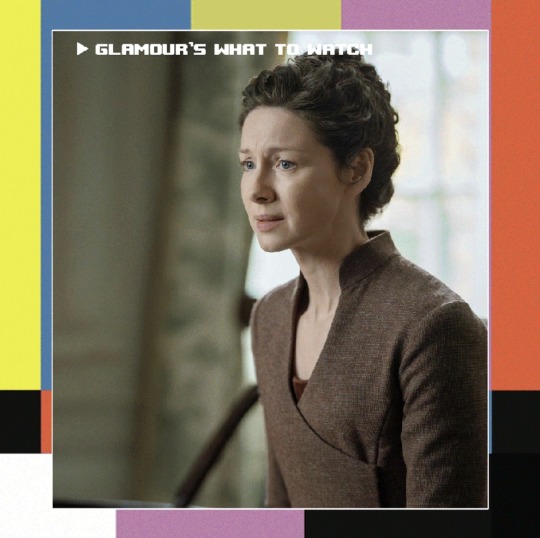
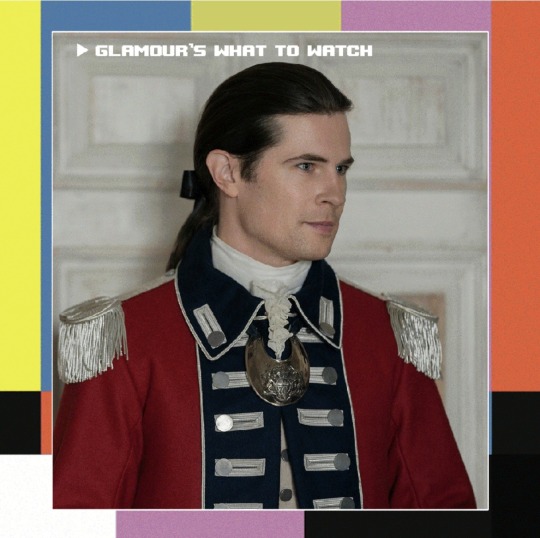
Glamour
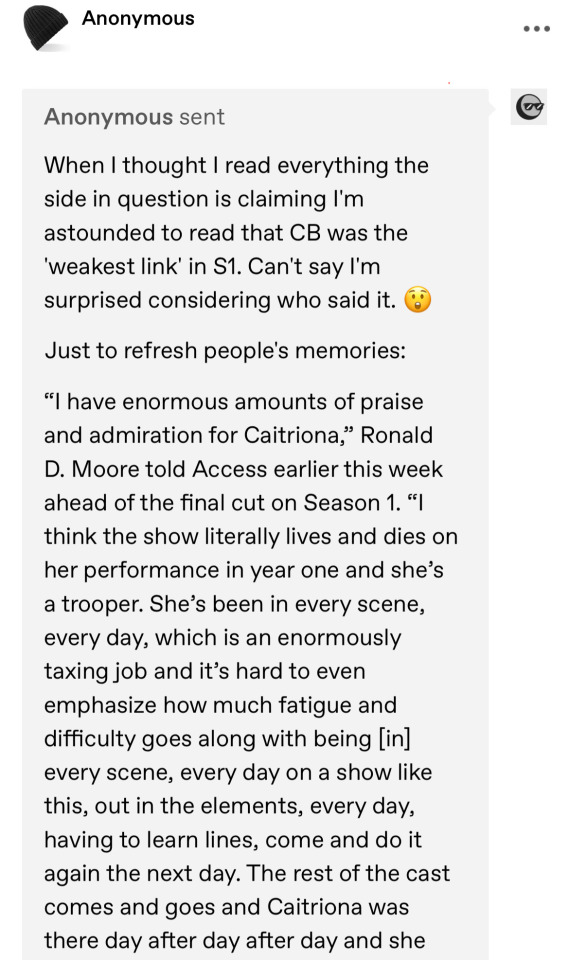
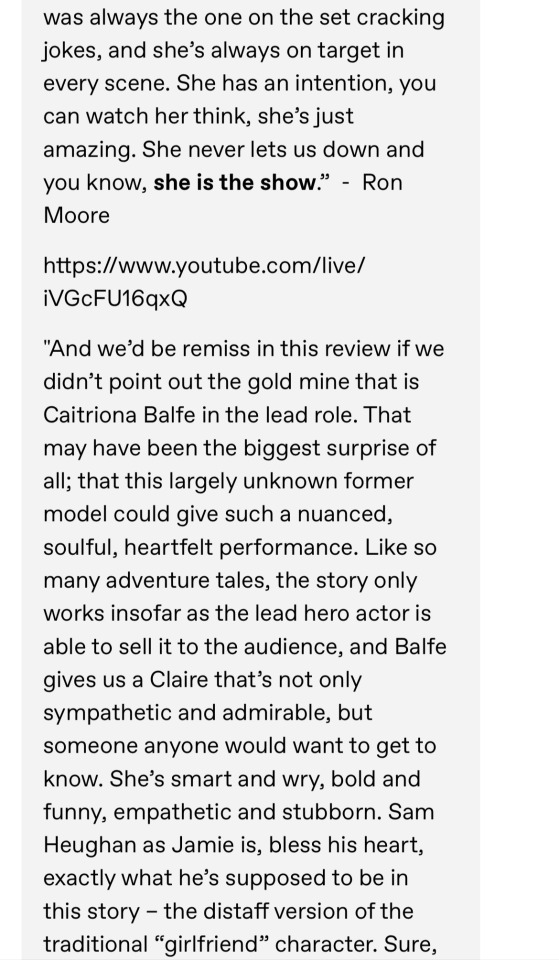
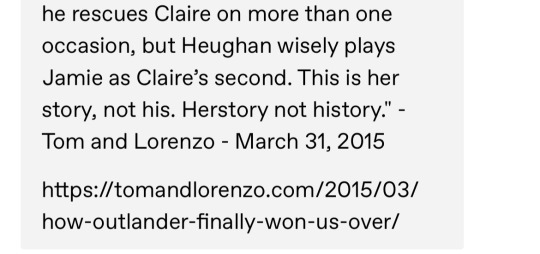
Thanks for the message, Anon. 😃 Are you quite sure someone said Caitríona was the weakest link in Season 1? How interesting. The Golden Globe Awards nominations committee must have been very hard up that year. 🤷🏻♂️
Here’s a clip from the 2015 Gold Derby video you quote:
Video 📹 clip from YouTube
I’m glad you included the 2015 bit from Tom & Lorenzo because the link refuses to cooperate with me. I imagine a lot of people who read the entire quote would see fightin’ words, but… “second” is an intriguing counter to “the weakest link,” is it not? 🤔

Galway 🇮🇪, November 2024 Instagram
Remember… Balfe gives us a Claire that's not only sympathetic and admirable, but someone anyone would want to get to know. She's smart and wry, bold and funny, empathetic and stubborn. Tom & Lorenzo
#Tait rhymes with hat#Good times#Inbox#Anonymous x 3#Caitríona Balfe#Outlander#Performance#Glamour#1 December 2024#YouTube#27 May 2015#Tom & Lorenzo#31 March 2015#Received 30 November 1&3 December/Responded 3 December 2024
27 notes
·
View notes
Text
THIS DAY IN GAY HISTORY
based on: The White Crane Institute's 'Gay Wisdom', Gay Birthdays, Gay For Today, Famous GLBT, glbt-Gay Encylopedia, Today in Gay History, Wikipedia, and more … December 24



1305 – France: Grand Master Jacques de Molay��and over 500 Knights Templar recant their confessions of homosexual activities to which they had admitted under torture. King Phillip IV burned 54 of them soon after the false confessions. Philip had de Molay burned upon a scaffold on an island in the River Seine in front of Notre Dame de Paris in March, 1314. The sudden end of both the centuries-old order of Templars and the dramatic execution of its last leader turned Molay into a legendary figure.


1573 – French diplomat and law professor Hubert Languet wrote to Sir Philip Sidney, "My affection for you has entered my heart far more deeply than I have ever felt for anyone else, and it has so wholly taken possession there that it tries to rule alone."

Sir Philip Sidney


1905 – Howard Hughes Jr. (d.1976) was a USA business magnate, investor, record-setting pilot, engineer, film director, and philanthropist, known during his lifetime as one of the most influential and financially successful individuals in the world. He first became prominent as a film producer, and then as an important figure in the aviation industry.
Later in life, he became known for his eccentric behavior and reclusive lifestyle—oddities that were caused in part by his worsening obsessive-compulsive disorder (OCD), chronic pain from a near-fatal plane crash, and increasing deafness.
Hughes dated many famous women, including Joan Crawford, Billie Dove, Faith Domergue, Bette Davis, Yvonne De Carlo, Ava Gardner, Olivia de Havilland, Katharine Hepburn, Hedy Lamarr, Ginger Rogers, Janet Leigh, Pat Sheehan, Mamie Van Doren and Gene Tierney. He also proposed to Joan Fontaine several times.However, a rumour persists that Hughes and another notorious womanizer Errol Flynn had a sexual relationship, with Flynn at the top man!
1912 – A report issued by Utah's State Board of Insanity recommends sterilization of persons convicted of sexual crimes.


Robert Joffrey (rear) with Gerald Arpino
1930 – Robert Joffrey, born Abdullah Jaffa Bey Khan, (d.1988) was an American dancer, teacher, producer, choreographer, and co-founder of the Joffrey Ballet, known for his highly imaginative modern ballets. He was born Abdullah Jaffa Bey Khan in Seattle, Washington to an Afghan father and Italian mother.
As a teenager, Joffrey met 22-year-old Gerald Arpino, then serving in the Coast Guard. Arpino moved into the Joffrey home. From then on, the two were inseparable. They became best friends, artistic collaborators, and lovers.
Joffrey studied ballet and modern dance in New York City and made his debut in 1949 with the French choreographer Roland Petit and his Ballet de l'Opéra National de Paris. From 1950 to 1955, he taught at the New York High School for the Performing Arts, where he staged his earliest ballets. He founded the Joffrey Ballet School in New York City in 1954.
In 1954 he formed his own company, which premiered Le bal masqué (The Masked Ball, 1954; music by French composer Francis Poulenc) and Pierrot Lunaire (1955; music by Austrian composer Arnold Schoenberg). Joffrey's other works include Gamelan (1962) and Astarte (1967), which was set to rock music with special lighting and motion-picture effects.
The Robert Joffrey Ballet took up residence at New York City Center in 1966. In 1982 it moved its principal activities to Los Angeles, California and in 1995 to Chicago, Illinois. Noted for its experimental repertoire, the company was called the "Joffrey Ballet of Chicago" after its move but has since returned to being called simply the Joffrey Ballet. Besides Joffrey's works its repertoire includes many works by Gerald Arpino, Joffrey's long-time lover, co-director, and eventually artistic director emeritus until his 2008 death, and ballets commissioned by Joffrey from new choreographers as well as works by such established choreographers as George Balanchine, Alvin Ailey and Twyla Tharp.
Joffrey was sexually promiscuous but discreet. His pattern was to have Arpino at home for domestic stability, one principal romantic attachment, and numerous one-night stands.
In 1973, Joffrey fell in love with A. Aladar Marberger, a 26-year-old gay activist and manager of the Fischbach Gallery in New York. In the 1980s, both men contracted AIDS. While Marberger was outspoken about his illness, Joffrey remained silent. He was ashamed and wanted his obituary to say that he died of liver disease and asthma. Arpino agreed to his pleas, but the secret could not be maintained, as AIDS took a staggering toll on the dance world in general and on Joffrey's company in particular.
Robert Joffrey died of AIDS on March 25, 1988 in New York City. Aladar Marberger died eight months later.


1952 – Kevin Killian is an American poet, author, editor, and playwright of primarily LGBT literature. My Vocabulary Did This to Me: The Collected Poetry of Jack Spicer, which he co-edited with Peter Gizzi, won the American Book Award for poetry in 2009. His novel, Impossible Princess, won the 2010 Lambda Literary Award as the best gay erotic fiction work of 2009.
Killian is also co-founder of the Poets Theater, an influential poetry, stage, and performance group based in San Francisco.
Kevin Killian was raised Roman Catholic and attended a Roman Catholic parochial school run by Franciscan monks where he suffered what he has described as "routine abuse". He discussed these experiences in an essay in the edited work Wrestling With the Angel, which describes the experiences of 21 gay men with religion. He was also the New York City spelling bee champion.
Kevin attended graduate school at the State University of New York at Stony Brook (SUNY-Stony Brook) in the 1970s, and moved to San Francisco in 1980. Although he is gay and Dodie Bellamy is a lesbian, the couple married and have an active heterosexual sex life.
Killian is also active in bringing attention to important LGBTQ artists and writers of the 1960s, 1970s, and 1980s. He has held poetry readings of a wide number of influential poets and writers, and participated in a number of panels, art installations, retrospectives, and memorials.


1958 – Bob Smith (d.2018) was an American comedian and author. Smith, born in Buffalo, New York, was the first openly gay comedian to appear on The Tonight Show and the first openly gay comedian to have his own HBO half-hour comedy special. Smith, along with fellow comedians Jaffe Cohen and Danny McWilliams, formed the comedy troupe Funny Gay Males in 1988.
With Funny Gay Males, Smith is the co-author of Growing Up Gay: From Left Out to Coming Out (1995). Smith is also the author of two books of biographical essays. Openly Bob (1997) received a Lambda Literary Award for best humor book. Way to Go, Smith! (1999) was nominated for a 2000 Lambda Literary Award in the same category. Smith published his first novel, Selfish and Perverse, in 2007, and Remembrance of Things I Forgot in 2011. He published a new collection of essays, Treehab: Tales from My Natural Wild Life, in 2016. The essays cover a wide range of subjects including his career in stand-up, his love of nature, and his experience with ALS. He performed at the inaugural We're Funny That Way! comedy festival in 1997, and appeared in the festival's documentary film in 1998.
While taping a 2007 comedy special for Logo, Smith disclosed that he was suffering from a neurological disorder. He described his symptoms at that time as slurred speech, making him sound inebriated. In response to an August 2012 New York Times article on openly gay male stand-up comedians, Smith posted a comment stating he had ALS.
On February 2013, Smith gave a candid interview to Canada's Global News, where he elaborated about his condition. The article also revealed that Smith assisted with the conceiving of fellow LGBTQ comedian Elvira Kurt's children, who with Kurt reside in Canada, and that he was a direct descendant of Henry Smith, an early settler of Canada's Niagara Region for whom the Henry of Pelham Winery is named.
Bob Smith died on January 20, 2018 from Lou Gehrig’s Disease in his Manhattan, New York home at 59 years of age.


1971 – On this date the international singer and actor Ricky Martin was born. Born Enrique Martín Morales in San Juan, Puerto Rico, he is known to millions of fans by his stage name Ricky Martin, is a Puerto Rican pop singer and actor who achieved prominence, first as a member of the Latin boy band Menudo, then as a solo artist after 1991. During his career he has sold more than 60 million albums worldwide. He is the founder of Ricky Martín Foundation (in Spanish Fundación Ricky Martin) a non-profit charity organization.
Martin rose to fame as a member of the Latin American boy band Menudo, after which he became a solo artist in 1990. During forays into acting on Broadway ("Les Miserables") and soap operas (General Hospital) he released numerous albums of Spanish music, which sold millions of copies throughout Latin America and Europe. In 1995, Martin refocused on his music career through his third album, A Medio Vivir. With this album, Martin made a shift from formulaic hit ballads to a more risky fusion of music centered around traditional Latin sounds, with the hit "Maria", which epitomizes this new sound. "Maria" broke Martin into Europe through Spain. With the ballad "Te Extraño, Te Olvido, Te Amo", Martin began his expansion from Latin American and Spanish-speaking audiences to the European and Asian markets. He was chosen to sing the anthem of the 1998 FIFA World Cup, the famous hit "The Cup of Life"/"La Copa de la Vida", that reached number one on the charts in 60 countries.
He broke into the English-language market with his mega-selling hit single "Livin' la Vida Loca," which reached number one in many countries around the world, including the United States, the United Kingdom, Argentina, Australia, Brazil, France, Greece, India, Israel, Italy, Japan, Guatemala, Mexico, Russia, Turkey, and South Africa. He followed up with the hit "She's All I Ever Had" which peaked at #2 on The Billboard Hot 100. This album became one of the top-selling albums of 1999, and was certified 7 times platinum, selling over 22 million copies worldwide to date.
During the Livin' la Vida Loca era, Martin's personal life went under the microscope due to his large Gay following, and he was questioned about his sexual orientation. In December, 2000 during an interview in The Mirror, Martin was asked, '"So what about all these rumors?" "There's not a lot I can do about that," he said. "I guess these rumors were started by people who don't have a life, or perhaps it's because they want me to be like them and I'm not. I try not to pay attention to any of these allegations. I could have been married with kids for years or have 27 girlfriends, and if people still want to go around saying that I'm gay, they will."'
In August 2008, Martin became the father of twin boys, named Matteo and Valentino. The babies were delivered via gestational surrogacy.
On March of 2010, Martin publicly came out as Gay in a post on his official web site by stating, "Today is my day, this is my time, and this is my moment. These years in silence and reflection made me stronger and reminded me that acceptance has to come from within and that this kind of truth gives me the power to conquer emotions I didn't even know existed ... I am proud to say that I am a fortunate homosexual man. I am very blessed to be who I am."
"What will happen from now on? It doesn't matter. I can only focus on what's happening to me in this moment. The word 'happiness' takes on a new meaning for me as of today. It has been a very intense process. Every word that I write in this letter is born out of love, acceptance, detachment and real contentment. Writing this is a solid step towards my inner peace and vital part of my evolution."
In January 2018, Ricky Martin married his long-time partner artist Jwan Yosef.

Ricky and Jwan


1973 – Paul Foot is an English comedian. He commands a significant cult following called The Guild of Connoisseurs. Foot is known for his musings, rants, 'disturbances' and apparent aversion to pop culture. The Daily Express likened Foot to "a rare exotic bird", whilst six national newspapers including the The Independent and The Age have declared Paul to be "a comedy genius".
Foot was born and raised in High Wycombe, Buckinghamshire, he studied mathematics at Merton College, Oxford.It was during his studies he first started performing stand-up. As of 2011 Foot has refused to discuss his years at Oxford or former pursuits as a mathematics student.
Graduating from Oxford in 1995, Foot was head-hunted by a computer software company in the run-up to the dot-com bubble, however he loathed the industry: "I had to read manuals on HTML and just write websites from scratch. None of us really knew what we were doing".
He started to pursue a career in comedy, doing open mic slots at various venues, in the hope that show business would allow him to meet his idol Ella Fitzgerald. Tragically Ella Fitzgerald died a few days after this decision was made, but Foot decided to stick with comedy as a career anyhow.
He is openly gay. Foot also has a much admired collection of pre-war Toby jugs, which he parades on a custom made milk float on his yearly trip to the Edinburgh Comedy Festival.


1981 – Chris Kluwe is a former American football punter and writer. Kluwe played at Los Alamitos High School in Los Alamitos, California, where he was a 1999 USA Today High School All-American, and then attended the University of California, Los Angeles (UCLA), where he played college football for the UCLA Bruins. He was signed by the Seattle Seahawks as an undrafted free agent in 2005 and played professionally in the National Football League for the Seattle Seahawks, Minnesota Vikings, and Oakland Raiders.
Kluwe is widely known for his eight seasons with the Minnesota Vikings, where he set eight individual team records. During this period, Kluwe became an outspoken advocate on social issues, including same sex marriage and gay rights, which ultimately led to tension between Kluwe and coaching staff.
Kluwe is widely known for his eight seasons with the Minnesota Vikings, where he set eight individual team records. During this period, Kluwe became an outspoken advocate on social issues, including same sex marriage and gay rights, which ultimately led to tension between Kluwe and coaching staff.
Kluwe publicly released a letter on September 7, 2012, via sports website Deadspin he had sent to Maryland state assembly delegate Emmett Burns, defending the opinions of Baltimore Ravens linebacker Brendon Ayanbadejo and condemning Burns on his attempt to stifle Ayanbadejo's free speech. Ayanbadejo has been a vocal supporter of same-sex marriage and Burns had sent a letter requesting that the Ravens ownership "inhibit such expressions" by their employee. On October 1, 2012, Kluwe published a letter to the editor that responded to a video statement released by former Viking Matt Birk in supporting a ban on same-sex marriage. In the letter, Kluwe outlined six primary reasons why he disagreed with Birk's statement. Kluwe was also featured in a documentary called The Last Barrier which aired on NBC Bay Area on December 8, 2012. During this interview he spoke about his feelings towards equality.
Kluwe and Ayanbadejo filed an amicus brief to the United States Supreme Court on February 28, 2013, regarding Hollingsworth v. Perry, in which they expressed their support of the challenge to California Proposition 8. Kluwe appeared on the January 18, 2013, episode of The Ellen DeGeneres Show, to discuss his support of same-sex marriage. Ellen DeGeneres inducted Kluwe as the first inductee in her Hall of Fame, since NFL punters are unlikely to be voted into the league's hall of fame. On April 16, 2013, in recognition of his steadfast support of same-sex marriage and for starting a conversation about LGBT issues in athletics, Kluwe was named the Grand Marshal of the 41st annual Twin Cities Pride festival in Minneapolis, Minnesota.
On January 2, 2014, Kluwe alleged that he was released from the Vikings due to his support of same-sex marriage. He stated that the Vikings requested that he "deliberately sacrifice my own numbers to help the team, a request with which I always complied." The team stated it was not previously made aware of Kluwe's allegations, and countered that he "was released strictly based on his football performance." Kluwe said that special teams coach Mike Priefer in 2012 made homophobic remarks and criticized the player for his views on same-sex marriage. Priefer responded with a statement saying that "I do not tolerate discrimination of any type and am respectful of all individuals. I personally have gay family members who I love and support just as I do any family member.” Kluwe called the coach's acts "inexcusable", and hoped he prevented Priefer from ever coaching again. He also alleged that head coach Leslie Frazier told him to stop speaking out on same-sex marriage. Kluwe later said his comments on Priefer were "a little too harsh originally", and stated that he preferred that the coach get therapy and counseling and return to the league as a role model.
Kluwe was released by the Vikings after the 2012 season, signed with the Oakland Raiders prior to the 2013 season, and was subsequently released. Kluwe was unable to find another NFL team with which to sign and retired from professional football in 2013. Following his departure from football, he has pursued a writing career and is a humor columnist for the sports website Deadspin.


2012 – The Serbian Parliament approves changes to the Penal Code to include sexual orientation and gender identity as protected classes when it comes to hate crimes.


2013 – Alan Turing considered the father of computer science, was a code-breaker who helped shorten WWII. Since he was gay, the British government offered him the choice of prison or chemical castration after he was convicted of gross indecency. He selected hormonal castration via estrogen. He died in 1954 of cyanide poisoning. In 2009, Prime Minister Gordon Brown made an official apology, and Queen Elizabeth II issued Turing a royal pardon on this day in 2013.



26 notes
·
View notes
Note
Roger really DOES have mad girldad energy and I am feral.
Welcome to my walls btw, it's hot af in Florida, so lmk if you need a popsicle/hj
Just. Omfg imagine Toki and Buggy bonding SO MUCH and Toki is the one who helps Buggy find Her Style and Her Confidence. Oden also has Big Himbo Dad Emergy too, so I bet he'd just be like ":000 a GIRL! WONDERFUL!!! I shall have TWO daughters!"
Roger ofc takes big offense to that and it becomes a shipwide brawl over who gets to be her dad, and Buggy is just laughing, crying, pickpocketing everyone. Only like. Three fellas even have the driving NEED to call her their daughter, they just love the chaos. Shanks is just left GAPING bc ofc he loves Buggy, he always has, always will, but the way she was smiling, the way she's just beaming at the acceptance, no matter how dramatic it is - by Davy Jones, it steals his breath away.
Whatever you do tho, don't imagine Toki dressing Buggy up in traditional Wano attire. Don't imagine Toki taking on the role of aunt or big sister and sharing this culture with Buggy. Teaching her the ways of warriors from her homeland, the codes and dress and recipes. Don't imagine Toki telling Buggy "family secrets" like recipes, fighting styles, etc. Don't imagine Toki just easily saying that of course Buggy needs to know these things! Blood is but the fluid of life, and love is what makes a family - and Buggy has so much love to give, so much to receive, and Toki calls her a child of Wano in heart and soul, in all the ways that matter should Buggy want that.
And Buggy, who has only ever wanted to BELONG, oh she accepts without hesitation.
Leaving Toki behind was hard, but she gifts Buggy an heirloom of sorts, a hair piece that she keeps either tucked under her beanie or safe in a chest, anchored to the floor of her room ((or hidden carefully with Devil Fruit powers)).
The day Toki manages to make/get a suitably sized kimono for Buggy, maybe for a party on the ship, maybe a birthday celebration ((and here I insert my Wano Culture Headcanons, that there's a birthday where children transition to young adults, and it's similar to a quinceñera but different, partially because it's done at 13, and then a second one at 18, a five year period of growth, life compared to butterflies, and so Toki convinces the crew to do these for the Cabin Kids-))
Buggy comes out, hair done, kimono flawless and bright and bold and so very her, a quiet joy on her face, and the crew is FLABBERGASTED.
Roger is sobbing.
Rayleigh has suddenly aged 20 years because oh shit oh gods she's going to be beautiful as an adult, oh damn it all he's gonna have to beat men off of her-
Shanks is caught between swooning, wanting to tackle her, and remembering just how the heck breathing works.
((Roger, Rayleigh, Crocus and Oden do rock paper scissors to get the first dance with her, and it dissolves into a fist fight somehow. Shanks gets involved and bites them. Toki takes the first dance.))
I have. So many emotions about transfem Buggy, bestie, send help it's all my brain can think about.
It's okay, I miss hot weather because here in Spain I am freezing and I am a spring child. My spiritual flower is a sunflower. I need the SUN. I NEED TO GO INTO THE FLAMES. So I'll stay there happily.
Please, Toki would so adopt Buggy. And Oden would be THRILLED. He'll see them getting along and he'd instantly say they look like mother and daughter. Buggy would be shy about it but Toki would probably laugh and say "Oh! Do we really? What do you think, Bugs?" and it's just,, So sweet,, Oden loves her a lot and he can't wait to see his Hiyori grow up too. Roger would be FURIOUS when he hears that because he "found her first" which, you know, true, but it's a weird way of saying that's his daughter. Anyway- Rayleigh would be so fucking done with everything. They'd fight about it and Buggy would actually have the time of her life because she feels important and flashy for once in a long time, and she'd laugh oh so beautifully at them when talking with Shanks about it in their room. Like she'd just laugh at the situation and Shanks is still not getting used to his very very not platonic feelings for his best friend. But he'd enjoy his time with her. He's just going a bit insane.
I can't stop thinking now about Buggy finally finding a place to belong. She's been lost for so long,, Feeling left out. And now Toki has gifted her with the most precious treasure there is: A home. Belonging. And I am so so emotional right now. Toki would be so proud of her and Buggy would just be so thankful. If Buggy called her 'mom' at some point, she'd feel embarrassed right away, but Toki would probably fight the tears and hug her close. Going crazy, really. All the men in Buggy's life fighting for her first dance,, Rayleigh just knows he'll have to fight all the men that hurt his precious star. And Shanks is starting to think about that too and the thought of Buggy dating somebody else makes him sick, so perhaps he needs to start with a plan to confess finally (he's so asking Toki about it. I'm gonna cry). Roger crying because he wants to enjoy every second he has left with her... It kills me.
I just know that to this day, Buggy still thinks about Toki as her mom. She never mentions it to anybody, but she feels such a strong connection to Wano and she's dying to go there finally someday. She might have not been born there, but her soul belongs there. And it's just so sweet. I am sobbing, thank you. Every time she does her hair, she feels Toki's hands instead of hers and she remembers everything she taught her,,,
Now I have on my mind a very silly Shuggy thought about Shanks trying to flirt with Buggy but failing miserably (because he's a kid and he only knows how to tease her or follow Roger's advice which are, um, not good) and Buggy just being so done and exhausted. She can't stand him! He's so annoying! Sometimes she doesn't know if she wants to punch him or kiss him! And she doesn't even know if Shanks likes her back because he keeps acting stupid. And she goes to Toki for advice and she's like "oh, darling... Men are stupid. Do you know why you felt smarter than them when you were unaware of being a girl? Well, one of the reasons is that Shanks is a kid. He's dumb. But he loves you and cares so much for you... He's just having a hard time trying to make his way to your heart" / "But he-! He's so damn- Ugh. He's such an idiot. He already did, and he just doesn't know because he can't see it and I can't stand him-" / "Well, maybe you should be the one telling him, huh?" / "What?! No! And give him the satisfaction of thinking I fell first?! I'd rather die. No. He has to make the first move". And now Toki is involved (like the rest of the crew because Shuggy is a whole teen drama) in their love story because Buggy keeps complaining about men being stupid and Shanks keeps saying he doesn't get how Buggy can't see he's in love with her.
#i think we're soulmates anon you always write exactly what i'm thinking :((#this is just so beautiful i am sobbing and now i want to write countless fics about this#god i swear this whole thing made my day#thank you so much for your asks really <333#fem buggy lives in my mind rent free forever i love her so much she's so important to me#one piece#buggy the clown#fem buggy#kozuki toki#roger pirates#red haired shanks#shuggy
147 notes
·
View notes
Text
YANDERE HP GOLDEN ERA; SLYTHERIN & RAVENCLAW
i have so many ideas mostly revolving around past oc concepts, but in general i think the slytherin's have the most yandere potential? aside from traits (cunning, determined, yada) that go hand in hand with yandere, i also find it easier to pin point the root of their tendencies. there's slytherins like draco who are straight up entitled, and some like theo who have been raised harshly, it's not difficult to imagine a scenario where draco, theo, blaise, .. develop into the yanderes we all know and love.
there's no plan for structuring my harry potter writings, but i think it'll mostly be brainstorming headcanons. i'm focusing on the golden era, so i'll write for characters alive during this time. I'll come up with a full character list and cast eventually but for now i'm most interested in getting ideas/requests for slytherin boys (blaise, draco, goyle, lorenzo, mattheo, theodore, adrian, terrence, marcus) and ravenclaw boys (anthony goldstein, michael corner, roger davies, terry boot) but gred and forge are always welcome as well.
okay so general rules for requests: only send in requests for golden era characters (there is a loop hole "if james survived" here if you're desperate but im mostly inspired to write the characters i've listed out. reader/darling is always gender neutral, no loopholes here. also i tend to cover both platonic and romantic paths (if applicable) either way in my writings so no need to specify. that all being said hound me with asks and any thoughts.
anyways here are some headcanons that have been clogged up in my brain recently;

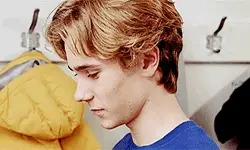
ANTHONY GOLDSTEIN (fancast: tarjei sandvik moe): my latest fixation, chat gpt molded most of my headcanons for yandere him. okay so not much is known about him but i'm going the route of jewish = polish = kowalski + queenie grandson / great grandson. all we have for a personality is 'friendly and good-natured' so i'm going to be making mountains out of molehills here.
i can imagine his intentions were pure first, he saw his darling didn't have the best upbringing, perhaps was a fractured individual, and 'desperately needed someone'. so he befriends them. for a long time, he's fully convinced himself his actions are done out of concern for his darling, other people really were just going to hurt them, and weren't trustworthy. and making good decisions has always been a strong suit of his, he isn't a ravenclaw for nothing, so his darling should just sit back, relax, and enjoy his company whilst he takes care of the hard stuff, alright?.
what started as a protective instinct turned into possessive jealousy, why does his darling want to pair up with malfoy for a potions assignment when he's far much more intelligent and easier to work with. actually, why do they have to speak to anyone else but him anyway? if they want a supportive friend, he's always been there. they want to banter with someone? anthony can do that!. they have a crush? they want romance? they want to overthrow the ministry of magic? no matter, he's a fast learner, and better for them than anyone else would be.
for the most part, anthony appears innocent, it's probably his darling who looks like the clingy, overattached one, because no matter what anyone else tells them, anthony will vilify them in the eyes of his darling, bringing his darling closer to him, gradually becoming more and more dependent on his constant presence. which is what he has subconsciously been working towards since he met them.
anthony is wholly devoted to his darling, and is among the more selfless yanderes (lookin at you draco). he has no future planned out, and allows his darling to take charge of the relationship so long as they don't look at anyone else. he's one of the more moldable yanderes; he adapts to his darlings personality, instead of having them adapt to his (camera pans to draco).
he's only really a danger to his darlings social life (and the lives of anyone who tries to tempt his darling away). his obsession is quiet for the most part, unlike others (draco) he doesn't need to resort to extreme measures (kidnapping) as he's able to read his darling like an open book (anthony inherited queenies legillimency and no one can convince me otherwise), and is thus able to ancitipate their needs, thoughts and desires. he'll become the only person their comfortable around;
anthony portrays himself as the one person who truly understands and supports his darling. he'll go to great lengths to prove his loyalty, even if it means crossing boundaries or engaging in morally ✨questionable✨ acts. once they finally realise just how tight of a hold he has on them, they'll be too dependent on him to do anything about it.


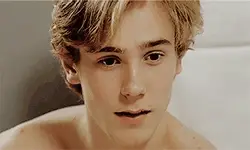
#yandere harry potter#anthony goldstein#yandere anthony goldstein#draco malfoy#blaise zabini#theodore nott#mattheo riddle#lorenzo berkshire#michael corner#terry boot#fred weasley#george weasley#gred and forge#harry potter#golden era#gregory goyle#yandere#no i'm not over hetalia#i still have asks from 2 years ago i intend to eventually get to#hp writings
121 notes
·
View notes
Text
.Marvel.Universe.
Request Page
Platonic = 🌼 Fluff = 🌺 Smut =🌹 Lime =⚘️ Angst = 🥀 Yandere =🍁
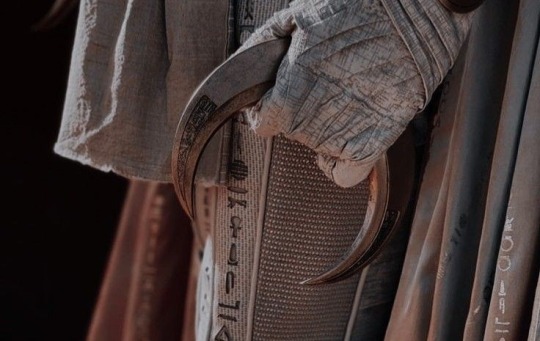
Imagines
Temptation - Bucky 🌹
Khonsu's Turn - Khonsu 🌹
Gentle Touch - Loki 🌺
Sit Upon The Throne - Loki 🌹
Praises - Marc 🌹
Five Stars - Peter 🌺
Combos
After Class Punishments - Moon System 🌹
Reflections - Moon System 🌹
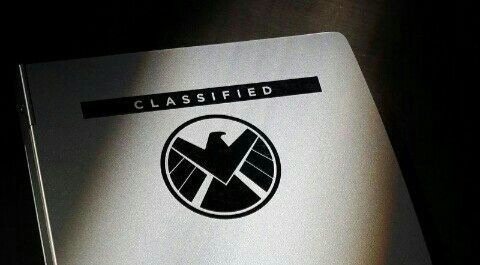
Incorrect Quotes
Crusty... What? - Bucky, Natasha
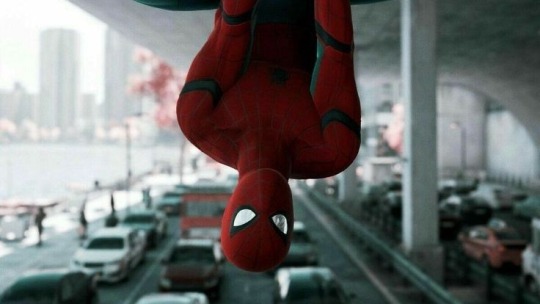
Drabbles
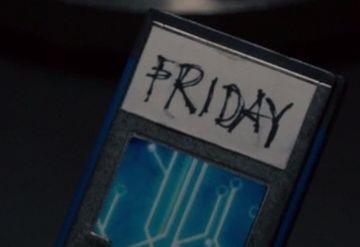
Oneshots
Drive On - Jake 🌹
Take A Breather - Miguel 🌹
Blood Flood - Peter 🌺
Combos
Save Him - Moon System 🥀🌺
Bloody Hands - Moon System 🥀🌺
Three For The Price Of One - Moon System 🌹
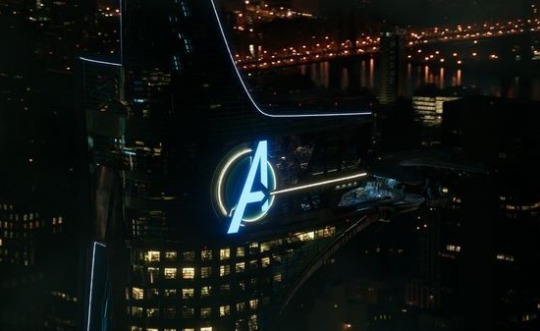
Series
Different Versions Oscar Isaac Characters: Moon System, Marcus, Shiv, Basil Stitt, Jonathan Levy, Llewyn Davis, William Tell, Cecil Dennis, Robbie Paulson, Outcome 3 (David), Santiago Gracia, Kane, Nathan Bateman, Leto Atreides, Poe Dameron, Peter Malkin, Bassam, Prince John, Orestes, Laurent Leclaire, Oscar Isaac
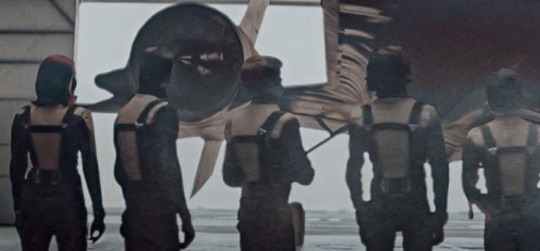
Modern Day
Medieval/Fantasy
Omegaverse

Crossovers
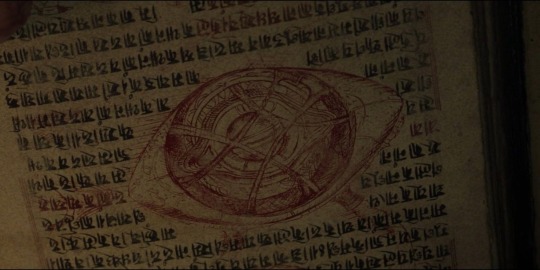
Preferences
Beach Sun - Bucky Barnes Petro Maximoff,Peter Parker, Steve Rogers, Thor, Tony Stark 🌹
Bubbling Heat - Jake Lockley, Tony Stark, Steven Rogers, Bruce Banner, Loki, Stephan Strange 🌹
Flashing Lights - Marc Spector, Jake Lockley, Peter Parker, Steve Rogers, Bucky Barnes 🌺
Kiss The Cook - Peter Parker, Steven Grant, Jake Lockley, Thor, Bucky Barnes 🌹
Movie Marathon - Jake Lockley, Peter Parker, Pietro Maximoff, Bucky Barnes 🌹
Player 2 - Peter Parker, Eddie Brock, Thor, Tony Stark 🌹 Feel The Beat - Bucky Barnes, Steve Rogers, Loki Laufeyson, Pietro Maximoff, Johnny Storm, Eddie Brock 🌹

NSFW and SFW Alphabet
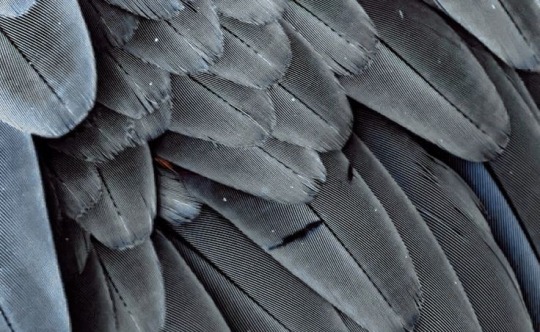
Headcanons
Apologizing After A Fight - Moon System
Dating An Artist - Moon System
they accidentally hurt you when having a nightmare - Moon System
Them when Your On Your Period - Stephen Strange, Loki Laufeyson, Bucky Barnes, Steve Rogers, Peter Parker
#marvel x reader#marvel imagine#marvel fluff#marvel#marvel smut#marvel fluff imagine#marvel fanfiction#marvel angst#marvel angst imagine#marvel smut imagine#marvel x you#marvel x y/n#marvel x reader smut#marvel x reader angst#marvel x reader fluff#marvel universe#marvel universe x reader
63 notes
·
View notes
Note
Reading your OP yandere isekais got me wondering how would they react to the Davy Back Arc lol. Great work btw I especially like the Purpose one!
Thank you, I'm glad to hear you liked it!
lol I'm actually currently on that arc right now funny enough and have thought about the same thing. I think as long as the Foxy pirates don't try to take the reader onto their team it would go relatively normally, but if they did... Oh boy. I'll put the rest under a cut for vague spoilers for Skypiea and Davy Back arcs
It would make sense for them to since it seems everyone that comes across the reader immediately goes full on yandere for them, and by that point in the series, the straw hats would definitely be catching onto that. Hiding them away is off the table, so now they're just trying to get them to keep a low profile and not attract attention. This doesn't work, and what do you know, after they lose the first game they immediately want the reader.
All hell breaks loose.
I imagine they would have already had some close calls before this, especially in Skypiea with Enel more than likely snatching them up for his own amusement. So to say they are all already on edge would be an understatement.
The announcer barely gets reader's name out before Luffy's fist connects with his face. His own face is stone cold but simultaneously seething. He's breathing heavy and tells them to try again. Foxy tries to remind him of the rules, but it's too late.
"We're pirates, since when do rules and regulations apply to us?" Sanji takes a drag of his cigarette, his expression just as chilling as Luffy's.
"Why don't we just end this here and now? The rules don't protect them from being wiped out by the other team," Zoro already had his swords drawn, looking disturbing nonchalant while talking about essentially massacring the enemy pirate crew. "They can't take our Jolly Roger and drag our names through the mud if they aren't alive. Dead men tell no tales, you know."
All the reader can do is watch on in horror as the monster trio live up to their reputations. Everyone else is crowded around you, trying to assure you that everything is okay and those awful people won't lay a hand on you. Their words are all in one ear and out the other. All you can focus on is the fact that your presence here has officially altered the story. You feel sick to your stomach wondering what else will change and who else is going to get hurt or killed because of you.
163 notes
·
View notes
Text
Anyways imagine a misunderstandings fic about Fedal where Rafa deep down is sad that Roger didn't show up for his last match when Roger actually wanted to go but didn't think Rafa'd want him there. They cross paths at some event months later and Rafa seems to be weirdly politely friendly to Roger so once he excuses himself to use the bathroom, Roger follows him.
"Hey, Rafa. Did I do something?"
"Why?" asks Rafa his speech a bit slurred from the wine he'd been drinking.
"I feel like you have been avoiding me"
Rafa laughs under his breath.
"Is rich coming from you"
"What is that supposed to mean?" asks Roger, hurt evident in his voice.
Rafa is done washing his hands and dries them on a paper towel.
"You didn't come"
Roger stands there watching Rafa crumple up the wet toilet paper and toss it into a bin.
"I-. I thought you didn't want me there."
"Why would I not want you there?"
"You never said otherwise. And the choice to retire at Davis Cup.Amongst other Spaniards. You all playing for your county. I thought i'd be out of place there. I assumed you wanted to retire surrounded by your closest people"
Rafa sight. Pinches his nose.
"I waited for you. When you didn't show up for singles I thought you would come watch doubles, no?"
"I am so sorry, Rafa, truly" he moves closer to Rafa.
"I wanted to be there, more than anything. I really did".
Roger reaches out to take Rafa's hand in his and squeezes his fingers.
"I would have loved nothing more than to have recipeocated the gesture and have held your hand"
Rafa lets out a chocked sound.
"Rogelio?" he is staring straight into Roger's eyes now.
"Yeah?" Roger is looking right back at him.
"You are my closest people, no?"
Rafa is close, Roger can feel his labored breaths on his skin.
Roger leans in. Rafa's lips are plush and taste of wine. The kiss is soft at first but grows hot and wet soon enough. Rafa's hands come to grab him - his left hand is sliding up Roger's neck into his hair,while with his right he's pulling at Roger's suit, wanting to get him closer. Roger lets him.
Roger whimpers once they break away. Rafa smiles at him.
"You know you were wrong", Rafa tell him, his lips redder than Roger has ever seen.
Roger laughs. "Yes, we have established that. I was stupid not to come. But really it was a misunderstanding an-"
Rafa bats his hand at Roger.
"No no, not this. I mean Laver Cup. It was YOU who held my hand, no?"
Roger looks at him playfully. "Does that really matter now Rafa? After what we just did?"
Rafa gives him a shy smile.
"It matters, no? You said reciprocation and reciprocation is if I hold your hand, yes?" he says.
"Let's get out of here, vamos," he reaches out to take Roger's hand in his and pulls him towards the door.
11 notes
·
View notes
Text










Dame Julie Goes to Nashville: The Story Behind Love Me Tender
In a career marked by unexpected turns, Julie Andrews' decision in 1978 to travel to Nashville and record a country album surely stands as one of her most surprising ventures. Her quintessentially British star image, coupled with her refined, classically trained singing style, would seem as far removed as imaginable from the twangy, down-to-earth aesthetic of American country and western music.
When the resulting album, Love Me Tender, finally reached the market in 1983—after more than four years of delays—astonishment was a common reaction. “Nanny Poppins sings Nashville,” declared one incredulous headline, adding: “Could it be? Yes, it is. Julie Andrews detouring from her squeaky-clean singing career, an English rose among the rhinestone cowgirls of Nashville, Tennessee” (Davis, 1983, p. 15).
Ultimately, Love Me Tender failed to make much of an impression and, outside of diehard fans, it has been largely forgotten. Even Julie herself seems to overlook it—the album doesn’t receive a single mention in her recent memoirs (Andrews, 2019). This neglect is unfortunate, as Love Me Tender represents a fascinating, if anomalous, chapter in Julie Andrews' storied career. It also offers a compelling glimpse into a period of professional challenge and reinvention as she sought to recalibrate her image in a rapidly changing world.
It Was Time: Country’s Rise and Julie’s Retreat
Viewed in historical context, the idea of a Julie Andrews country album may not be as outlandish as it initially appears. The 1970s was a time of profound transformation for country music and Julie Andrews alike. The rise of ‘countrypolitan’—a polished, pop-oriented style of country music—blurred boundaries between traditional country and mainstream genres, bringing Nashville’s sound to a wider audience (Stimeling, 2015). Crossover artists like Dolly Parton, Kenny Rogers, and Willie Nelson achieved mainstream chart success, while pop and rock performers such as The Eagles, Linda Ronstadt, and Olivia Newton-John incorporated country influences into their work (Hill, 2015).
Films and TV shows also reflected this crossover. Movies like Nashville (1975), Urban Cowboy (1980), and Coal Miner’s Daughter (1980), along with shows like The Dukes of Hazzard (1979–1985), helped popularise country music and culture among mainstream audiences (Stimeling, 2015). As the Chicago Tribune noted in 1978, country music had “broken out of the hayseed demographics that used to separate [it] from the urban world and ascended to giddier climes and sales figures” (Hurst, 1978, p. 24). This shift made country music an increasingly cosmopolitan space—one where even an ‘English rose’ like Julie Andrews could plausibly find a foothold.
Meanwhile, the 1970s marked a period of equal change and upheaval for Julie. Professionally, it was not a particularly successful decade. It began with the commercial failure of Darling Lili (1970), followed by the cancellation of two highly anticipated big screen musicals, Say It with Music and She Loves Me. Turning to television, she launched The Julie Andrews Hour in 1972. Though critically acclaimed and the recipient of several major awards, the variety series struggled in the ratings and was cancelled after just one season (Andrews, 2019).
The consensus seemed to be that Julie’s wholesome image and traditional musical style had become culturally passé. “In this the age of ‘hip’ lyrics and braless singers, Miss Andrews' apple-pie songs and antiseptic appearance seem oddly out of step with the times,” observed one commentator (Ferguson, 1972, p. 26). Julie herself reluctantly agreed: “I think I’m a little dated,” she admitted in a 1970 interview. “I’m clearly not where Easy Rider is at, and I think it would be very difficult for me to arrive there” (Siskel, 1970, p. E5).
What followed was a period of professional ‘lean years,’ punctuated by the occasional TV special and a minor film, The Tamarind Seed (1974). By the mid-1970s, Julie had largely faded from the public radar. One journalist facetiously asked, “Whatever happened to Julie Andrews?” (Goodman, 1976, p. 11-A), while another remarked, “Not since Luise Rainer…has any motion picture star risen so fast or fallen so far as Julie Andrews” (Higham, 1977, p. C-1).
For her part, Julie appeared content to step away from the limelight and focus on her family. She and her husband, Blake Edwards, had recently adopted two children and were working to blend their new family. Relocating to Switzerland, Julie embraced her private role as wife and mother (Andrews, 2019).
“I travel as Mrs. Edwards these days,” she remarked in 1975. “My career? I’m afraid that’s up in the air at the moment and will remain so till Blake makes his plans… If it suits his schedule for me to work, then I might do a little something” (Scott, 1975, p. D-12). By 1978, she extolled the virtues of semi-retirement: “I’m only devoting about 20 percent of my time to my career and 80 percent to my family” (Scott, 1978, p. 8C).
The few projects Julie took on during this period were, unsurprisingly, closely tied to Blake. He produced and directed nearly all her film and TV work. He was also the one who persuaded Julie to accept a one-week residency at Las Vegas’ Caesars Palace in 1976. “It wasn’t my idea at all,” she admitted. “Caesars Palace made me a tremendous offer [and] Blake talked me into going ahead” (Higham, 1977, p. C-1).
Love Is A Place Where Two People Fall: Blake’s Push and Butler’s Pull
Blake was also the driving force behind Love Me Tender. A native Oklahoman with a deep affection for the music of the American heartland, he believed the simple melodies and heartfelt lyrics of country music would suit Julie’s voice. As she explained in a British television interview:
“Blake…thought that country music might sit very well on my voice, which is not an easy voice [with which] to sing popular or modern music…It doesn’t adapt to it that easily, and he felt that country music would be good” (Freeman, 1983).
Reluctant at first, Julie considered country music “pretty hokey,” but upon closer listening, she discovered its appeal. “I found that the songs are really terribly pretty,” she said, noting parallels to the English folk music she had loved and sung as a child (Thomas, 1982, p. 1).
Flush with the renewed success of the Pink Panther franchise, Blake even financed the recording sessions under the aegis of his own production company (Beck, 1978, p. 16). Given its private funding and tentative nature, the recording plans were largely kept under wraps.
There were a few passing mentions in the press. A syndicated column in May 1978 noted that Julie was back Stateside with Blake “and their gaggle of children,” adding that she “will cut an album of songs while she’s here” (Eder, 1978, p. 5B). Another report from early 1978 observed:
“Andrews also is working up an album. ‘I love recording. It is like swimming, quiet and personal,’ she said. But because the recording industry has become so complex, she is doing this one through Trellis Enterprises, a company she and her husband formed about a year ago” (Burton Terry, 1978, p. A10).
Contracted to helm the new album was Larry Butler, Nashville’s most celebrated record producer of the time (Cunniff, 1980; Wood, 2012). A multitalented industry veteran, Butler began as a session pianist, vocalist, and songwriter before graduating to producing albums for some of Nashville’s biggest stars, including Johnny Cash, Dottie West, and Kenny Rogers. Widely regarded as a key architect of the crossover “countrypolitan” wave of the 70s, Butler became the only country producer ever to win a Grammy (Leigh, 2012). “Good music is good music,” he averred, “and doesn’t have to be labelled” (Cheever, 1980, p. 12).
Butler’s success drew a diverse range of recording artists to Nashville to work with him, from Don McLean and Sammy Davis Jr. to Kim Carnes, Debby Boone, and Nana Mouskouri (Trever-Burchinger, 2000, p. B3). Confident in his abilities, Butler famously boasted, “With the right song, I can cut a hit record with a janitor” (Hurst, 1978, p. 24).
When I Dream: Warm Reception and Creative Leap
So, it was on 2 June 1978 that Julie Andrews found herself flying to Nashville to enter the recording studio for the first time in nearly five years. Accompanied by her Los Angeles manager, Jerry Nutting, she received a warm welcome from Larry Butler, who greeted her at Nashville Municipal Airport with a bouquet of yellow roses and a stretch limousine (Hance, 1978, p. D10).
That evening, Butler hosted a gala reception at ASCAP headquarters on Music Row to formally welcome Julie to Nashville. Co-hosted by Ed Shea, ASCAP’s regional executive director, the event attracted numerous civic and industry leaders (Browning, 1978, p. 35). Nashville’s mayor, Richard Fulton, declared it "Julie Andrews Day," while Tennessee Governor Ray Blanton made her an honorary citizen, and Sheriff Fate Thompson appointed her an honorary Deputy Sheriff (Carter, 1978, p. 1).
Despite the fanfare, both Julie and Butler were circumspect about their plans. Julie stated that she was “thinking” about recording in Nashville, adding, “We’ll decide over the next few days. That’s really why we’re here – to decide” (Carter, 1978, p. 1). For the first few days, Butler immersed Julie in country music, having her spend hours listening to various records. Together, they compiled a list of potential tracks to try in the studio (Freeman, 1983).
The recording sessions took place at Jack Clement Recording Studios on Belmont Boulevard, which Butler co-owned with his business partner, Al Mifflin. A year later, Butler purchased the studio outright, renaming it Sound Emporium—a name it retains to this day (McNutt, 2000). For the sessions, Butler assembled a stellar lineup of musicians from the famed "Nashville A-Team," including Bob Moore (bass), Hargus “Pig” Robbins (piano), Pete Drake (steel guitar), and Ray Edenton (guitar) (Stimeling, 2020). Overseeing the recordings at the console was Billy Sherrill, one of the most renowned sound engineers in Nashville and a longtime colleague of Butler's.
Butler’s preferred mode was to record in the studio at night which he felt was more conducive to creativity and the free flow of ideas (Butler and Goodenough, 2012, p. 185). “I believe in momentum,” he explained. “When you get an idea, do it!” (Manley, 1981, p. 1B). He also fostered an intentionally collaborative atmosphere in the studio that emphasised trust, teamwork and enjoyment. “I quickly realised that as a producer, the best way…to walk into a studio and come out of there with emotion is to be the opposite of a dictator” (Butler and Goodenough, 2012, p. 185).
Typically, Butler began each session by allowing the musicians and the artist to play around with the material, letting ideas develop organically. After this initial period, he would return to review their progress and refine the arrangement collaboratively. As he described, “The result is a melting pot of emotions from everybody in that room [and] that’s what makes these moments the very best” (Butler and Goodenough, 2012, p. 186).
This organic approach allowed the musicians to move swiftly. A typical night's studio session would run approximately three hours and result in recording up to four songs (Stumbling, 2020, p. 2). Not all of these songs would be used and many would be 'scratch tracks', preliminary versions that would subsequently be re-recorded and/or overlaid with other tracks. However, it exemplifies the efficiency and creative speed that defined the recording process in Nashville.
This rapid, freeform style was a marked contrast to the tightly disciplined approach Julie had experienced on Broadway and in Hollywood, where recordings were meticulously planned and rehearsed. “In Nashville, we were literally making music as we went along,” she recalled. “I had no idea, any night I went into the studio, what I’d end up singing, in what key I’d be singing it…we just made music on the spot” (Hatch, 1983).
Initially hesitant, Julie came to embrace the looser, improvisational Nashville approach. “It was very good for me,” she admitted, “because I’m rather a careful person, and this made me loosen up” (Freeman, 1983). She also discovered a different quality in her voice. In their sessions, Butler encouraged Julie to “drop her voice an octave” and sing with a less classical tone (Barron, 1978, p. S79). She later expressed how singing with this “quiet voice…is very pleasant for me to use because it’s very easy…I don’t have to aim for high notes or a certain kind of purity. It just kind of is” (Freeman, 1983).
Over the course of more than a week, Julie recorded in excess of a dozen tracks, ranging from country classics like Crazy to contemporary crossover hits such as We Don’t Make Love Anymore, and even soft rock staples like You Don’t Bring Me Flowers. Most of these songs had already been recorded by other artists, with some indelibly associated with certain singers. This practice is common in country music, where professional songwriters craft songs that are reinterpreted by various performers, often multiple times (Cusic, 2005). Such a tradition reflects country music’s deep roots in oral storytelling and its communal repertoire, where emotional authenticity takes precedence over originality. Performers bring their unique artistry to familiar songs, transforming them into something distinctly their own (Peterson, 2013).
While Julie was still in the midst of recording, local gossip columnist Bill Hance (1978) reported that industry insiders were predicting big things. “Music Row sources say she is cutting an album so good she played a portion of it over the phone to her husband, film producer Blake Edwards, who was back home in Los Angeles.” Allegedly, Blake was so impressed by what he heard that he flew to Nashville to join Julie (Hance, 1978, p. D5). Hance also noted that her presence in the studio attracted a string of high-profile visitors, including Waylon Jennings, Roy Clark, and Johnny Cash (ibid; Anderson, 1978, p. 23).
Reflecting on this period in his memoirs, Butler described Julie as “one of the sweetest people I have ever met. She was totally unaffected by her success; she had no ego at all” (Butler & Goodenough, 2012, p. 143). One of his favourite anecdotes, frequently recounted in interviews, involved Julie visiting his home one evening. She asked for a sharp knife to trim the wicks of his candles, explaining, “They burn so much better when they are trimmed.” Amused, Butler thought, “I’ve got Mary Poppins trimming my wicks! That was so cool!” (ibid, p. 144). On another occasion, while taking a break during a late-night studio session, Butler proposed something unexpected:
“A friend of mine, nicknamed ‘Skull’ from the show Hee-Haw happened to own a strip club in Nashville’s Printer’s Alley. I said, ‘Julie, have you ever been to a strip club?’ ‘No!’ ‘How’d you like to go?’ With a sparkle in her eye and that delightful British accent came her reply, ‘Let’s do it!’” (Butler & Goodenough, 2012, p. 143-44).
Jimmy Capps, one of the Nashville A-Team session guitarists who worked on the album, has similarly fond memories of Julie:
"She was an international star. But she was a real lady in the studio. She was a class act...During our sessions, Julie hardly spoke at all. She let Larry Butler do all the producing. She didn't want very much input. She let us all play what we wanted, and how we thought was best. And it turned out to be great album" (Capps and England, 2018, p. 130).
You Don’t Bring Me Flowers: Polishing Up and Gathering Dust
Julie completed the main recording sessions by mid-June and returned to Los Angeles, where Blake was busy preparing for the release of The Revenge of the Pink Panther and starting pre-production on 10 (1979), which would mark Julie’s return to the big screen after a five-year absence (Andrews, 2019).
Meanwhile, back in Nashville, Butler began the meticulous process of polishing the recordings. As he described in his memoirs (Butler & Goodenough, 2012), this involved selecting the best takes from the sessions and adding layered tracks to create the signature rich Nashville sound. The legendary Jordanaires and other top Nashville vocalists provided backing vocals, while Bill Justis and Bergen White composed string arrangements performed by the Shelly Kurland Strings and the Nashville String Machine Musicians. With these elements in place, Butler mixed the tracks into their final form, ready for pressing.
Julie and Blake appeared optimistic about the album’s prospects. At the press preview for The Revenge of the Pink Panther, Hollywood columnist Shirley Eder reported that the party’s Western barbecue theme provided a fitting backdrop for Julie to share news of her Nashville venture. Eder wrote, “Mary Poppins singing C&W? Wanna bet she does darn good at it, too?!” (Eder, 1978, p. 15A).
Blake, in particular, was enthusiastic about the project’s potential. Marilyn Beck quoted him predicting significant industry interest: “[T]hree major recording firms are interested in buying it,” he said. “We’re also talking to ABC about using it as the take-off point for a TV special – but Julie says she will only be interested in doing the special if the album is a hit” (Beck, 1978, p. 16). Similarly, Maggie Daly of the Chicago Tribune captured Blake’s excitement: “It’s a new Julie with a whole new musical career in front of her” (Daly, 1978, p. 4-S5).
Despite this optimism, plans for the album ultimately stalled. There were a few murmurs of activity into early 1979. For instance, pre-publicity for 10 included press notes mentioning that “In the weeks just preceding the making of 10, Julie went to Nashville to cut an album which will have a new ‘Julie sound’” (Warner Bros, Inc., 1979, p. 3). After this, however, the project fell silent, and the album would not resurface for another three years.
Another Somebody Done Somebody Wrong Song: Revival and Reinvention
The turn of the decade marked a sharp reversal of fortunes for Julie. Between 1979 and 1982, she starred in four films, culminating in Victor/Victoria (1982), a critical and commercial triumph. The film earned her a Golden Globe Award, an Academy Award nomination, and accolades such as Hasty Pudding’s Woman of the Year and the People’s Choice Award for Favourite Film Actress. As one commentator quipped, “Julie Andrews has arrived. Again!” (McDaniel, 1982, p. 11).
This resurgence rekindled interest in Julie’s shelved country album. By late 1982, reports surfaced of her return to Nashville to collaborate once more with producer Larry Butler. The Tennessean announced: “Nashville producer Larry Butler and songstress Julie Andrews were recording a double album for a British label at the Sound Emporium this week” (Neese, 1982, p. 29). Similarly, Billboard reported: “Julie Andrews is working on her newest LP (a double album)…produced by Grammy Award-winning producer Larry Butler, with Harold Lee engineering” (Morris, 1982; Stein, 1982).
While the new album would draw substantially on tracks recorded in 1978, most reports framed it as a completely fresh venture, omitting mention of the earlier sessions—a likely marketing strategy to present the album as contemporary rather than a dusted-off project. One of the few media reports to acknowledge the earlier sessions appeared in Family Weekly which noted:
“Julie Andrews…has gone off to Nashville to record with longtime Kenny Rogers producer Larry Butler…. Julie worked with Butler in Nashville in 1978 on similar material and was pleased with the results, but no record label made an offer for the album. Andrews hopes that by adding some new songs a major company may pick up the album” (Ask Them, 1983, p. 2).
Another piece in Country Music magazine quoted Julie’s personal manager, Jerry Nutting, as saying that Julie and Larry Butler “recorded 13 songs in 1978 [and] this year they recorded 12 more songs, and the entire package will be released in a 25-song double album” (Pugh, 1983, p. 17) Among the most notable new additions was a duet with Johnny Cash on Love Me Tender, which became both the album’s title track and, in some markets, a 45rpm single. Local Nashville columnist Red O’Donnell reported:
“Actress Julie Andrews came to Nashville with no advance warning to record a country music album. While in the studio, Johnny Cash dropped into the studio where the recording session was underway and sang a duet with her. ‘I don’t know if it is going to be on the album or not,’ said Cash. ‘Miss Andrews was cutting one of my songs, and I dropped in to thank her for doing it” (O’Donnell, 1982, p. 30).
Promotion for the pending album ramped up in late 1982 and 1983. Syndicated Hollywood correspondent, Bob Thomas, devoted one of his columns to the album:
“Julie Andrews has done it all – British vaudeville, Broadway musical, Hollywood extravaganzas, television series, children’s novels and now a country music album…After a career that has known Everest-like highs as well as a few lows, Julie Andrews at 47 still hunts for new challenges – like the country album…Larry Butler, who has supervised recordings by Kenny Rogers, Tammy Wynette and other country greats, produced the album. It will be released next year” (Thomas, 1982, p. 1)
In November 1982, Julie previewed a song from the album on Bob Hope’s Pink Panther Thanksgiving Gala. Billed as “an all-star spectacular celebrating the 20th anniversary of the Pink Panther films,” the program served as a promotional showcase for Blake Edwards’ projects (Barnes, 1982, p. 2C). Julie’s contributions included a duet with co-star Robert Preston from Victor/Victoria and a performance of Love is a Place Where Two People Fall, the album’s sole original composition, written for her by Larry Butler. Possibly to boost the program’s country appeal, Willie Nelson also appeared as a guest performer.
We Love Each Other: The British Launch
The “British label” that finally secured Julie’s country album was Peach River Records, an independent company established in 1980 by psychedelic folk singer turned music publisher Tim Hollier. Peach River was Hollier’s second venture into record labels, following the short-lived Songwriters Workshop. With distribution support from PLT (formerly PYE), Hollier assembled a small but eclectic roster of artists, including David Knopfler of Dire Straits fame, Papa Rage, and Peter Sarstedt (Larkin, 1998).
Releasing Julie’s album through a small independent label was, as one report noted, “rather unusual for such a well-known artist.” Julie explained: “They’ve given the album the kind of personal attention that I knew it would probably have missed had it been released by a major company” (White, 1983, p. 17). Julie may have been putting an overly positive spin on things, but Hollier certainly invested effort in the album’s UK launch.
The first task was selecting a title. In the early 1980s, duets between artists from disparate genres were popular—think Kenny Rogers and Kim Carnes’s Don’t Fall in Love with a Dreamer or Willie Nelson and Julio Iglesias’s To All the Girls I’ve Loved Before. Following this trend, the album was named after Julie’s duet with Johnny Cash, Love Me Tender.
Although early reports suggested a double-disc release, the album ultimately came out as a single LP featuring 14 tracks. The cover photograph, shot by renowned celebrity photographer Greg Gorman, perfectly complemented the album’s tone. It featured Julie in a cream wool jumper, gazing warmly at the camera with her chin resting on her hand, set against a taupe backdrop. The image exuded a mix of softness, warmth, and intimacy, mirroring the album’s vocal style.
Love Me Tender officially launched in the UK on 1 July 1983, under the catalogue number JULIE 1. Julie arrived in London at the end of June for an intensive promotional campaign, kicking off with a press conference at Burke’s Club on 27 June. Over the next week, she made numerous TV and radio appearances, participated in photo shoots, and gave one-on-one interviews at her suite in the Dorchester (Eborall, 1983, pp. 6–7; Seaton, 1983, p. 6). One photo shoot, featuring Julie beside a flower seller’s cart, evoked her My Fair Lady days as Eliza Doolittle, inspiring headlines like “Country L.P. for an English Rose” (Saturday Profile, 1983, p. 6).
The promotional push paid off handsomely. Love Me Tender initially launched with a 5,000-copy pressing, which sold out within a week. A second pressing of 30,000 copies followed—an exceptional figure for the UK market (Pugh, 1983, p. 17). By mid-July, the album was charting in the UK Top 100, where it remained for over five weeks, becoming Julie’s most successful non-film or non-show recording in the UK (Top 100, 1983, p. 20).
Buoyed by the success, Peach River quickly capitalised. In early August, they released a 45rpm single of the Love Me Tender duet. Later that year, they reissued Julie’s 1975 Christmas LP, The Secret of Christmas under the title Julie Andrews’ Christmas Album, with new cover art referencing the Love Me Tender design (New Albums, 1983, p. 25).
Blanket on the Ground: Global Rollout
One challenge of signing Love Me Tender to Peach River Records was the UK label’s lack of an established global distribution network. As a result, international rights were sub-licensed to various labels, leading to a patchwork of releases across different markets. For instance, the album was distributed by Attic in Canada, Dureco Benelux in the Netherlands, Splash Records in Spain, and Prince in South Africa.
In Australia, Love Me Tender was licensed to J&B Records, a mid-price label specialising in middle-of-the-road artists like Harry Secombe, Max Bygraves, Willie Nelson, and Anne Murray. Released in September, the Australian edition featured 16 tracks -- two more than the UK version. One of these, I Still Miss Someone (featuring Johnny Cash’s backing vocals), had been the B-side of the Love Me Tender single in the UK, while the other, We Don’t Make Love Anymore, was previously unreleased. J&B Records’ regional reach into Oceania and Southeast Asia helped the album achieve strong sales in the Australasian market (Guest & Maloney, 1991).
The Japanese release, however, stood out for its exceptional quality. Licensed to the prestigious Nippon Phonogram Company and distributed on the Philips label, the album was pressed by Victor Company in Yokohama and released in January 1984. Like the Australian edition, it included 16 tracks and featured specially commissioned liner notes by Shigeru Kawabata, a prominent music journalist for Tokyo Shimbun and Weekly Gendai. Kawabata wrote with genuine affection for Julie and the album:
“Even with the contemporary approach [of Love Me Tender], Julie avoids simply copying the standards. Her meticulous interpretation transforms these songs into her own. This care is evident in the way she speaks about the album. We are now holding the most refined and beautiful expression of contemporary standards in our hands. Just as Julie graced Broadway musicals with the elegance of serious musicianship, she has now opened another brilliant chapter with this studio recording. Discovering this gem amidst the overwhelming flow of today’s musical output is a quiet joy. I hope to continue treasuring such beautiful musical encounters in the future” (Kawabata, 1983).
At the opposite end of the spectrum was the album’s release in the United States. Despite being the heartland of country music, the American debut of Love Me Tender was disappointingly lacklustre. Licensed to the small Los Angeles-based Bainbridge Records --founded in 1980 by marketing veterans Stan Marshall and Lee Armstrong to service the middle-of-the-road (MOR) music market -- the label secured US rights in late 1982 but delayed the release until 1984 (Sippel, 1980). When it finally launched, minimal marketing and poor decisions -- such as reducing the track list to just 10 songs -- ensured the album barely made an impact.
The reasons for the poorly handled US release remain unclear. By 1984, the countrypolitan wave had waned, and both critical and popular sentiment had shifted. Reviewing another Larry Butler-produced album, critic Dave Mulholland (1981) decried it as “Larry Butler’s production [of] standard countrypolitan mediocrity. It represents the worst of the Nashville assembly line” (p. 20).
Country audiences were gravitating back to a more classic sound, heralded by the rise of the neotraditionalist movement with a new breed of singers like Randy Travis, George Strait, and Reba McEntire. Mainstream audiences, meanwhile, had tired of the crossover sound, and by 1984, sales of country albums had dropped to their lowest levels in nearly a decade (Haslam, Haslam, & Chon, 1999, p. 259).
A 1983 Country Music magazine article profiling the UK launch of Love Me Tender reflects the growing skepticism toward pop artists crossing into country:
Twenty years ago, who could have foreseen...one of the most enduring staples of the music scene: the country album by the pop star. With few exceptions, however, most pop-star country albums -- generally conceived as last gasps of a faded career for an artist with little or no connection to country music -- make about as much impact as a bug flying into a windshield. Now comes the latest to try her hand at the country album game, and one of the most ostensibly unlikely: Julie Andrews. "Julie has sold 25 million copies of soundtrack albums," said Jerry Nutting, her personal manager, "but she has never cut a solo album per se… We don't feel this is a 'gimmick' album. Julie is very sincere in doing it, very enthusiastic during the recordings and very hopeful of making a contribution to country music” (Pugh, 1983, p. 17).
While shifting cultural tides in American music by the mid-1980s were less than ideal for Love Me Tender, the complete absence of marketing effort remains puzzling. Extensive searches of newspaper databases reveal no mentions of the US release—no advertising, no press coverage, nothing. This is particularly odd given Bainbridge Records’ marketing background and stated goal to “renovate” the underserved MOR market (Sippel, 1980, p. 15).
Some Days Are Diamonds: Brickbats and Bouquets
Leaving aside the album’s oddly weak US push, Love Me Tender was generally well received in most other markets. It achieved solid sales and garnered decent airplay. While it didn’t attract extensive critical attention, the reviews it did receive were generally respectable. Some critics questioned Julie Andrews’ fit within the country genre, but others celebrated her versatility and praised the album’s polished production and heartfelt interpretations. Below is a selection of excerpts from reviews around the world:
Daily Mirror (UK): “Amazing – Julie Andrews and Johnny Cash singing Elvis Presley! It’s superb and deserves to be a hit” (Eggar, 1983, p. 19).
The Telegraph (UK): "If I had to put together a list of the Top Ten superstars I'd like to see in concert here, Julie's name wouldn't get written down. Until now that is. The courageous experiment of the star to risk her career in Nashville laying down a hoedown and applejack LP Love Me Tender, all the big names do it inevitably -- has been a huge success and broadened interest in her talents" (MacIlwaine, 1983, p. 11).
Gramophone (UK): “Julie Andrews? You would have to believe it if you heard her duetting with Johnny Cash in Love Me Tender, which has been picking up plenty of radio air play. That track gives us the title of Julie's own contribution to the Nashville legend…The magic formula is here for all to appreciate once again - Larry Butler in charge of production, Billy Sherrill the engineer (who couldn't produce a bad record if he tried), strings by Shelley Kurland, and even the ubiquitous Hargus "Pig" Robins on piano. Yes, this is a fine recording and no mistake. But the voice is wrong. Frankly, Julie Andrews just isn't at home in Nashville: she is too sweet, too pure, too precise, too English. The few lines of Love Me Tender which the croaking Johnny Cash contributes spell out in a few seconds just what is wrong with the rest of the record. And to hear the very proper Julie Andrews (I'm sorry, but I can't help it if the 'image' sticks in my mind) naughtily singing of the potential pleasures of a Blanket on the ground is just too much for a listener of my sensibilities to take (Chislett, 1983, p. 541).
Manchester Evening News (UK): “It must be one of the most surprising double acts ever – Julie Andrews and Johnny Cash. The two have brought out Elvis Presley’s old classic, Love Me Tender, which was recorded at the home of country music, Nashville, with highly respected producer Larry Butler…Peach River Records say the combination may seem ‘extraordinary’ but it works ‘wonderfully’. To me it works for some of the times, but there are awkward moments and Cash sounds as though he’s singing deeper and deeper as age increases” (Jasper, 1983, p. 19).
Belfast News-Letter (UK): “Julie Andrews and Johnny Cash hoped to jump on the current pop duet bandwagon with a sweet ‘n’ sour version of Elvis Presley's Love Me Tender. But talk about square holes and round pegs! The Sound of Music songstress and the gravelly-voiced country star mix about as well as a one-armed man at a juggling party. For Julie is simply too good a singer and Cash too poor a singer for this oil and water combination to work” (McAdam, 1983, p. 8).
The Age (Australia): "Known for her crystalline voice and impeccable diction, Andrews takes a turn into the realm of country-inspired ballads, proving her versatility and emotional depth as a singer…Fans of her earlier work will appreciate how Andrews carries her trademark poise into this genre, while newcomers may find themselves enchanted by her ability to convey intimacy and sincerity. While some might question her foray into country, Andrews makes it her own, reminding listeners that great singing transcends musical styles" (Walker, 1983, p. 18).
Show Music (USA): "A few months back, we were moaning over the fact that Julie Andrews doesn't make it into the recording studios very often. Well, guess what? Peach River Records, Ltd., in England, has gotten the lady back on record in what is one of her best efforts. It was recorded in Nashville, and Miss Andrews takes to country-flavored songs like a duck takes to water. There are lovely versions of Some Days Are Diamonds, When I Dream, Crazy, We Love Each Other, and even a successful duet with Johnny Cash on the album's title-track. Julie sounds just great, and her sensitive readings of these songs make us hope that her next outing will be a collection of some of the best of recent Broadway material" (Preeo, 1983, p. 29).
The Advocate (Canada): “Julie Andrews shows her country and pop side on Love Me Tender, an impressive album of soft melodies making the most of her beautiful, timeless voice. Produced in Nashville by Larry Butler, Love Me Tender includes the cream of Nashville’s musical community. Johnny Cash joins Andrews on Love Me Tender. They sound great together. When I Dream shows Andrews’ power to reach the heart of the listener, in this love ballad on loneliness. In this, her 23rd album so far, Andrews again adds to the sound of music around the world. You won't need a spoonful of sugar to make this LP enjoyable” (Kennedy, 1984, p. 34).
Fanfare (Canada): “He’s out of his mind, they’re saying, he’s off the edge, Julie Andrews for God’s sake! You got it! Love Me Tender (Attic LAT-1189) is apparently her 23rd album, and it's as tasty a batch of country-baked tunes as have come down the pike in years. Lots of last-waltz-style material, which she does easy and effortless and entirely on the money. Larry Butler lavished outstanding Nashville production on it, and the 14 tracks (including a duet with Johnny Cash) are delivered in a warm, clear, wide-eyed voice. Julie Andrews says: ‘The songs aren't easy. They're simple, plain, honest, and that's the hardest thing to sing.’ She shouldn't have worried” (Flegler, 1985, p. 27).
‘The Valley That Time Forgot’: Epilogue
In the four decades since its release, Love Me Tender has been criminally overlooked. Unlike many of Julie’s other works, the album has never been issued on CD or made available in digital formats. Without the efforts of devoted fans to preserve and share tracks online, awareness of the album might have vanished entirely. This lack of visibility is regrettable, given the significant creative effort invested by Julie and the many talented collaborators who worked on the album over four years. From Larry Butler’s meticulous production to the contributions of Nashville’s A-Team musicians, Love Me Tender represents a labour of love that deserves to be remembered and appreciated.
This blog post is a modest attempt to redress the historical amnesia surrounding Love Me Tender and restore at least some recognition to this fascinating piece of Julie Andrews' legacy. It may not have achieved the commercial success or enduring acclaim of her other work, but it stands as a poignant reminder of her courage to embrace the unfamiliar and her dedication to creative exploration. In revisiting Love Me Tender, one is reminded of Julie’s ability to bring grace and sincerity to even the most unexpected of projects.
Sources:
Anderson, B. (1978). Bill Anderson’s Countryside. Nugget Focus. 21 July, p. 23.
Andrews, J. (2019). Home work: A memoir of my Hollywood years. Hachette.
Ask Them Editors. (1983). Ask them yourself. Family Weekly. 16 January, p. 2.
Barron, F. (1978). Soundtrack. The Hollywood Reporter 254(7), 12 July, p. S79.
Barnes, S. (1982). Hope honors Panther pictures. The Gazette. 20 November, p. 2C.
Beck, M. (1978). Seller says ‘Revenge’ is last Panther film. The Telegraph-Journal. 26 August, p. 16.
Beck, M. (1982). Julie Andrews cuts country record in Nashville. The Citizen. 30 June, p. 87.
Browning, G. (1978). They’re throwing a party for Julie. The Tennessean. 26 May, p. 35.
Burton Terry, C. (1978). Julie Andrews knows few limitations. Asbury Park Press. 6 March, p. A10.
Butler, L. & Goodenough, D. (2012). Just for the record: What it takes to make it in the music industry and in life. Indigo River Publishing.
Capps, J. & England, S. (2018). The man in back: Jimmy Capps, the autobiography. England Media.
Carter, W. (1978). Expansive city help greets Julie Andrews. The Tennessean. 3 June, pp. 1
Cheever, D. (1980). ‘Crossover’ artists straddle country-pop fence. Maine Event, 6(19). 8-14 November, p. 12.
Chislett, W. A. (1983). Easy listening: Love me tender. Gramophone. 61(725). October, p. 541.
Cunniff, A. (1980). Special tribute section: The Larry Butler success story. Record World 37(1716), 16 October, pp. 28-56.
Cusic, D. (2005). In defense of cover songs. Popular Music and Society, 28(2), 171–177.
Daly, M. (1978). 3,000 miles for Shaun’s smiles. Chicago Tribune. 19 July, p. 4-S5.
Davis, V. (1983). Nanny Poppins sings Nashville. Daily Express. 25 June, p. 15.
Eborall, B. (1983). Just popping in…for ever Mary Poppins. Daily Post. 5 July, pp. 6-7.
Eder, S. (1978). Julie Andrews plans new album. Saturday Telegraph and News. 13 May, p. 5B.
Eder, S. (1978). ‘Panther’ party: fun in the sun. Detroit Free Press. 6 July, p. 15A.
Eggar, R. (1983). Rock & pop scene: tips for the top. Daily Mirror. 2 August, p. 19.
Evans, H. (1982). Julie Andrews goes country. The Spokesman Review. 7 November, p. 2.
Ferguson, T. (1972). Television. The Vancouver Sun. 11 September, p. 26.
Flegler, J. (1985). Julie Andrews: Love me tender. Fanfare, 8, p. 27
Freeman, C. (Producer). (1983, June 29). A Plus [Television broadcast]. Thames Television.
Guest, T.J. & Maloney, M. J. (1991). Thirty years of hits, 1960-1990: Melbourne Top 40 research. M.J. Maloney.
Goodman, B. (1976). Julie Andrews in TV spotlight. The Atlanta Journal. 19 October, p. 11-A.
Gold & Sneed. (1982). The music beat… Chicago Tribune. 24 October, p. 2-S1.
Hance, B. (1978). Julie Andrews turns country? The State Journal. 10 June, p. D-10.
Hance, B. (1978). Ray Price eyes comeback. The State Journal. 17 June, p. D-5.
Haslam, G. W., Haslam, A. R., & Chon, R. (1999). Workin' man blues: Country music in California. University of California Press.
Hatch, D. (Producer). (1983, June 6). Gloria Hunniford Show [Radio broadcast]. BBC Radio.
Hill, J. (2015). Country comes to town : The music industry and the transformation of nashville. University of Massachusetts Press.
Higham, C. (1977). The rise and fall – and rise – of Julie Andrews. The New York Times. 21 August, pp. C-1, C-22.
Hurst, J. (1978). Tomorrow’s country-pop superstars. Chicago Tribune Magazine. 26 November, pp. 24-25.
Iley, C. (1983). International dateline: United Kingdom. Cash Box. 3 September, p. 27.
Jasper, T. (1983). Pop parade: At the double. Manchester Evening News. 9 August, p. 19.
Kawabata, S. (1983). Liner notes [Liner notes]. In Julie Andrews, Love Me Tender [Album]. Philips. Japanese release, Catalogue No. 28PP-81.
Kawabata, S. (1991). The Japanese record industry. Popular Music 10(3), October, pp. 327–45.
Kennedy, G. (1984). Album corner: ‘Love Me Tender.’ The Advocate. 25 August, p. 3B.
Larkin, C. (Ed.). (1998). The encyclopedia of popular music (3rd ed.). Muze.
Leigh, S. (2012). Larry Butler: The only country record producer to win a Grammy. The Independent. 25 January, p. 42.
Manley, T. (1981). Hit man. Des Moines Register. 14 January, p. 1B.
McAdam, N. (1983). Rock: round pegs in two square holes. Belfast News-Letter. 5 August, p. 8.
McDaniel, W. (1982). Burying Mary Poppins. Spectrum. 23 April, 1982.
McNutt, R. (2000). Too hot to handle: An illustrated history of American recording studios of the twentieth century. HHP Books.
Morris, E. (1982). Studio track. Billboard, 94(41).16 October, p. 43.
Mulholland, D. (1981). Country style. Daily Herald Tribune. 6 February, p. 20.
Neese, S. (1982). Nashville Notes. The Tennessean. 25 September, p. 29.
New albums. (1983). Music Week. 29 October, p. 25.
O’Donnell, R. 1982. Some country singers picked new names. Johnson City Press. 13 November, p. 30.
Peterson, R.A. (2013). Creating country music: Fabricating authenticity. University of Chicago Press.
Preeo, M.O. (1983). New releases. Show Music 3(2), p 29.
Pugh, J. (1983). Mary Poppins Country. Country Music, 103, September/October, p. 17.
Saturday Profile. (1983, August 13). Country L.P. for an English rose. The Mail. p. 6.
Scott, V. (1975). Julie Andrews’ career is up in the air.’ The Sun-Telegram. 12 March, p. D-12.
Scott, V. (1978). Semiretirement for Julie. The Sunday News. 25 May, p. 8C.
Seaton, R. (1983). Julie’s different sound of music. Daily Express. 28 June, p. 6.
Sippel, J. (1980). MOR gets boost on the new L.A. Bainbridge label. Billboard. 22 Nov, p. 15.
Siskel, G. (1970). Julie Andrews an attractive 34 going on 18. Chicago Tribune. 22 March, p. E5.
Sloan, R.A. (1982). Gossip column: Chris Reeve still likes playing a super-hero. The Sun. 7 November, p. C-2.
Stein, S. (1982). Andrews music. Billboard, 94(50). 18 December, p. 28.
Stimeling, T. D. (Ed.). (2015). The country music reader. Oxford University Press.
Stimeling, T. D. (2020). Nashville cats: Record production in Music City. Oxford University Press.
Thomas, B. (1982). Julie Andrews, An over-achiever still in search of challenges – like country music. Variety News Chronicle Magazine. December 17-23, p. 1.
Top 100 Albums. (1983). Music Week. 13 August, p. 20.
Trauelsen, J. (1982). Just a country gal. The Daily Argus. 23 June, p. D1.
Trever Burchinger, E. (2000). He writes the songs that inspired a museum: Award-winning Larry Butler comes back home to Gulf Coast. Pensacola News Journal. 18 August, pp. B1-B3.
Walker, C. (1983). Records. The Age. 12 December, p. 17.
Warner Bros., Inc. (1979). Pressbook: 10. Warner Bros., Inc.
White, C. (1983). English rose blooms again. Music & Video Week. 23 July, p. 17.
Wood, G. (2012). Larry Butler. In P. Kingsbury (Ed.), The encyclopedia of country music (p. 70). Oxford University Press.
© 2024, Brett Farmer. All Rights Reserved.
#julie andrews#love me tender#nashville#country music#larry butler#the jordanaires#johnny cash#countrypolitan#1970s#1980s#popular music#record albums
9 notes
·
View notes